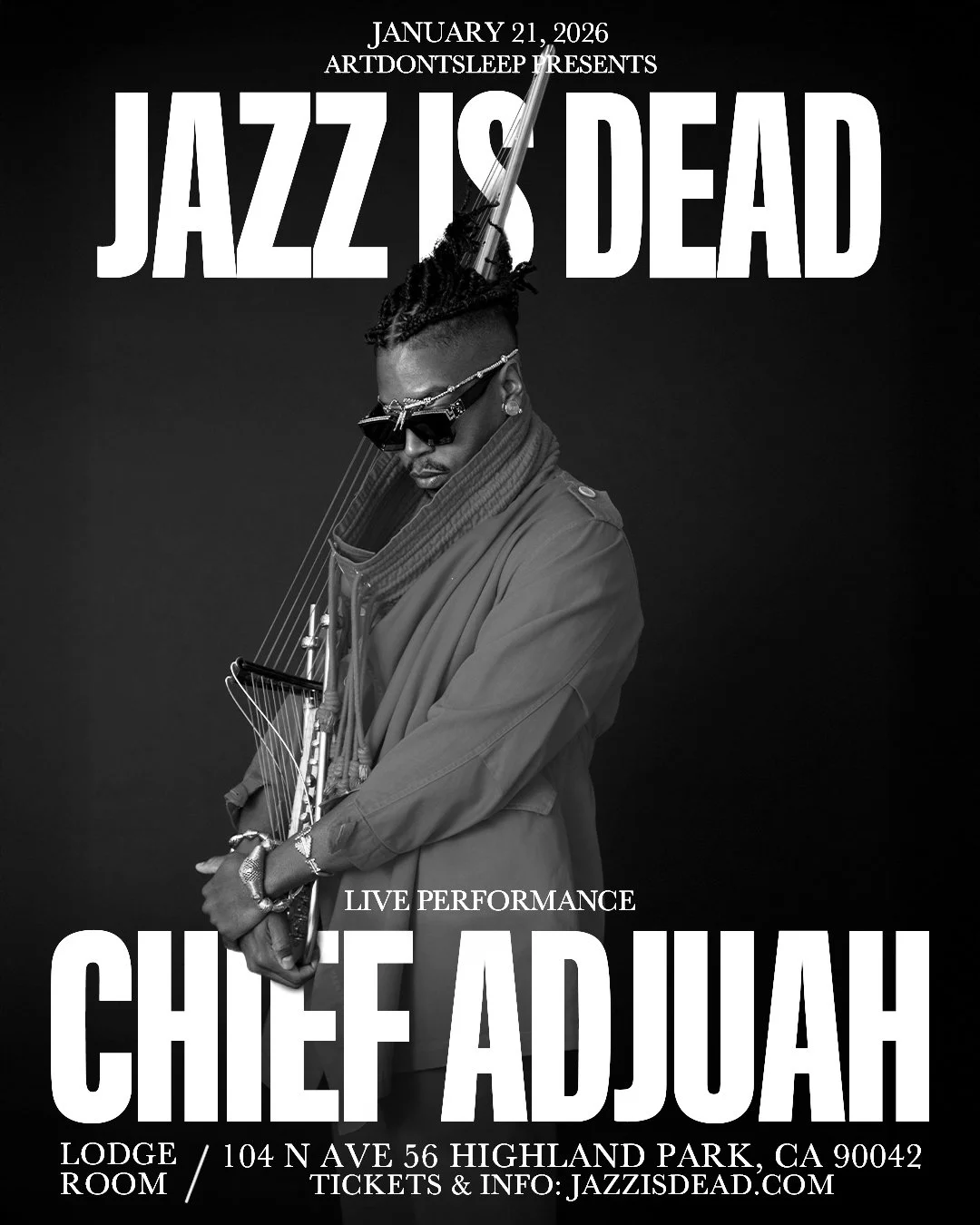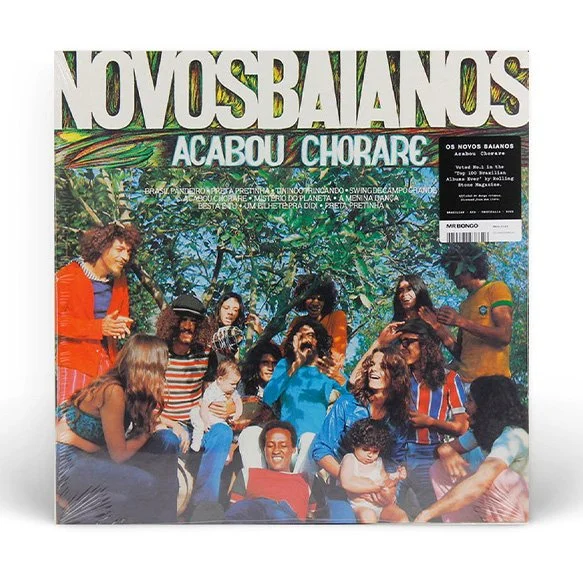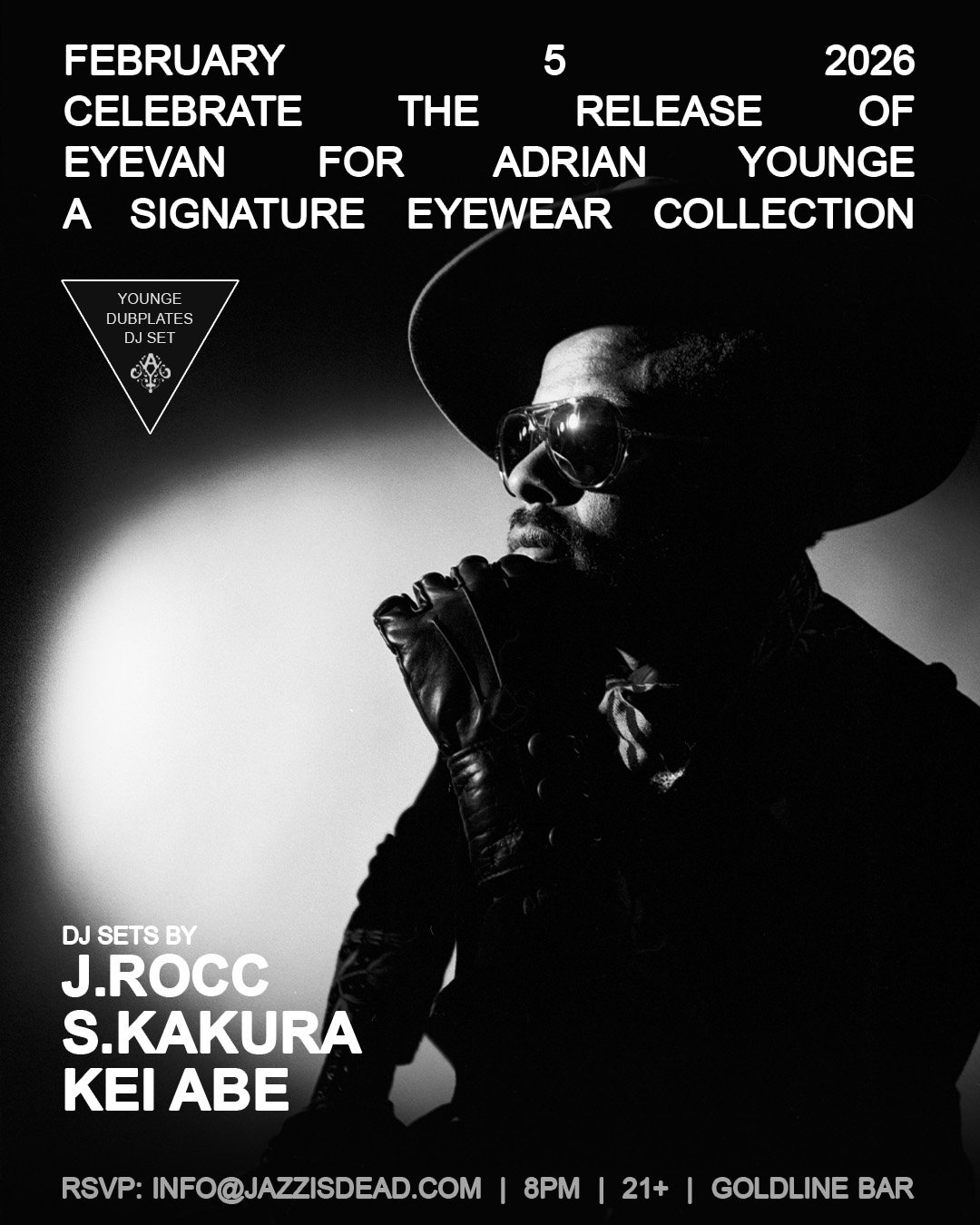
ADRIAN YOUNGE X EYEVAN: EYEWEAR RELEASE PARTY
Introducing Eyevan for Adrian Younge, A Signature Eyewear Collection.
Join us Thursday, February 5 in LA at @goldlinebar to celebrate the release of @adrianyounge’s signature eyewear collection by @eyevan_official.
To mark the occasion, Adrian is hosting a special dubplate listening party, sharing unreleased music from his forthcoming album & beyond. Featuring DJ sets from @jrocc210, @s_kakura_, and @keiabe.
📆 February 5
📍 @goldlinebar
⏰ 8 PM
RSVP: info@jazzisdead.com

SUN RA ARKESTRA
Sun Ra founded the Sun Ra Arkestra in Chicago in the mid-1950’s. Sun Ra was among the earliest pioneers of the synthesizer and the free jazz revolution of 1960’s. Sun Ra sent a strong spiritual and musical message to his Arkestra wanting them to help make the universe better through positive vibrations and music.
The Sun Ra Arkestra are known worldwide for their live shows that combine big-band swing, space-age free jazz, be-bop, singing, dancing, chanting and Afro-pageantry. The Arkestra has been at the forefront of Afro-futurism since their inception.
The Arkestra have recorded more than 100 albums. Their 2020 album “Swirling” was nominated for a Grammy Award for Best Big Band Jazz Ensemble recording.
After more than 60 years the band continue to circle the globe on their Inter-Galactic tour. Recent highlights include shows at the Kennedy Center with Solange, The Berlin Opera House, the Burlington Jazz Festival and a New York City show at Radio City Music Hall.
Few bands have travelled this far – cosmically and musically.
“The possible has been tried and failed. Now it’s time to try the impossible.”
Sun Ra Space is the Place!

COCHEMEA LIVE IN LOS ANGELES
Tickets will be available for sale on Friday, November 14, 2025.
Music is in multi-instrumentalist and composer Cochemea Gastelum’s blood—he comes from a long line of musicians on both sides of his lineage. For over 25 years, Cochemea has built a distinct career as a soloist, section player, and composer/ arranger, collaborating with artists across genres— from his long tenure with Sharon Jones and the Dap- Kings to work with Kevin Morby, Run The Jewels, Jon Batiste, Amy Winehouse, The Roots, Archie Shepp, Mark Ronson, and Quincy Jones, among many others.
His forthcoming album on Daptone Records, Vol. 3: Ancestros Futuros, is the third volume in a series that includes All My Relations (2019) and Vol. 2: Baca Sewa (2021). Across his body of work, Cochemea interweaves the past, present, and future, engaging with time as speculative history— one that moves fluidly between memory and possibility.
For Vol. 3: Ancestros Futuros, he gathered a core group of longtime collaborators—a powerhouse octet of New York City percussionists and members of Daptone’s famed rhythm section. Gabriel Roth (aka Bosco Mann) returned as producer and mixing engineer, capturing the band live to 8-track analog tape. Accompanied by a 9-minute film mixed in Dolby Atmos, this volume also marks Cochemea’s evolution into visual storytelling.
Cochemea’s previous releases have been praised by DJs and critics alike. His Daptone debut, All My Relations, was a family reunion of sorts, uniting spirits, musicians, and melodies across time and place. Leading a nine-piece ensemble, he recombined ancient elements— drums, winds, and voice—into a deeply personal meditation on the interconnection of all things. Vol. 2: Baca Sewa directed this exploration into the archives of family history, mythology, and the cultural imaginary. Pitchfork called All My Relations “equal parts spiritual journey and irrepressible funk.” Mojo awarded the album four stars, noting “its message of harmony and oneness is universal,” while Downbeat described Vol. 2: Baca Sewa as “radiating like a flower from beginning to end.”
Vol. 3: Ancestros Futuros is anchored in the cultural fabric that has nurtured Cochemea from the beginning. A California native of Yaqui ancestry, Cochemea describes a central part of his work as “accessing ancestral memory that comes in different forms—sometimes when you visit a place, sometimes in dreams... it’s in our DNA. For me, it’s about seeking wholeness in these zones of fracture.”
Dreams play a vital role in his creative process. “A lot of melodies come to me through dreams,” he shares. “I’ve kept a record of them for years, shaping the language into dream scores as foundations for compositions that connect the conscious and unconscious realm.” One such score appears on the back cover of Ancestros Futuros, reflecting the intuitive and layered nature of his work. This dream- guided approach informs the album’s opening track, Transmisión del Soñar, which serves as a portalbetween dimensions.
The album is also shaped by stories of survival and resistance. The title track, Ancestros Futuros, draws from a story of a Yaqui midwife who would bury the navels of newborns in the ground so that future generations would rise and reclaim the land. “I was thinking about survival as a continuum connecting past and future generations,” Cochemea explains, a theme that echoes throughout his compositions.
Cochemea’s musical and spiritual synthesis is made possible through his reverence for the horn and the music and traditions that precede him. His distinct voice as a saxophonist and flutist places him within a lineage of players who honor the past while blending dexterity with invention. Inspired by heroes like Eddie Harris, Yusef Lateef, Jim Pepper, and Gato Barbieri, he coaxes his instruments into intimate and expressive realms, bridging ancestral rhythmic traditions with forward- looking vision, creating a signature sound that is both deeply rooted and expansive.
Vol. 3: Ancestros Futuros finds Cochemea building worlds of sound, blending past, present, and future into a ritual offering —an evolving sonic fiction carried across space-time, where memory, survival, and imagination converge.

COCHEMEA LIVE IN BERKELEY
Tickets will be available for sale on Friday, November 14, 2025.
Music is in multi-instrumentalist and composer Cochemea Gastelum’s blood—he comes from a long line of musicians on both sides of his lineage. For over 25 years, Cochemea has built a distinct career as a soloist, section player, and composer/ arranger, collaborating with artists across genres— from his long tenure with Sharon Jones and the Dap- Kings to work with Kevin Morby, Run The Jewels, Jon Batiste, Amy Winehouse, The Roots, Archie Shepp, Mark Ronson, and Quincy Jones, among many others.
His forthcoming album on Daptone Records, Vol. 3: Ancestros Futuros, is the third volume in a series that includes All My Relations (2019) and Vol. 2: Baca Sewa (2021). Across his body of work, Cochemea interweaves the past, present, and future, engaging with time as speculative history— one that moves fluidly between memory and possibility.
For Vol. 3: Ancestros Futuros, he gathered a core group of longtime collaborators—a powerhouse octet of New York City percussionists and members of Daptone’s famed rhythm section. Gabriel Roth (aka Bosco Mann) returned as producer and mixing engineer, capturing the band live to 8-track analog tape. Accompanied by a 9-minute film mixed in Dolby Atmos, this volume also marks Cochemea’s evolution into visual storytelling.
Cochemea’s previous releases have been praised by DJs and critics alike. His Daptone debut, All My Relations, was a family reunion of sorts, uniting spirits, musicians, and melodies across time and place. Leading a nine-piece ensemble, he recombined ancient elements— drums, winds, and voice—into a deeply personal meditation on the interconnection of all things. Vol. 2: Baca Sewa directed this exploration into the archives of family history, mythology, and the cultural imaginary. Pitchfork called All My Relations “equal parts spiritual journey and irrepressible funk.” Mojo awarded the album four stars, noting “its message of harmony and oneness is universal,” while Downbeat described Vol. 2: Baca Sewa as “radiating like a flower from beginning to end.”
Vol. 3: Ancestros Futuros is anchored in the cultural fabric that has nurtured Cochemea from the beginning. A California native of Yaqui ancestry, Cochemea describes a central part of his work as “accessing ancestral memory that comes in different forms—sometimes when you visit a place, sometimes in dreams... it’s in our DNA. For me, it’s about seeking wholeness in these zones of fracture.”
Dreams play a vital role in his creative process. “A lot of melodies come to me through dreams,” he shares. “I’ve kept a record of them for years, shaping the language into dream scores as foundations for compositions that connect the conscious and unconscious realm.” One such score appears on the back cover of Ancestros Futuros, reflecting the intuitive and layered nature of his work. This dream- guided approach informs the album’s opening track, Transmisión del Soñar, which serves as a portalbetween dimensions.
The album is also shaped by stories of survival and resistance. The title track, Ancestros Futuros, draws from a story of a Yaqui midwife who would bury the navels of newborns in the ground so that future generations would rise and reclaim the land. “I was thinking about survival as a continuum connecting past and future generations,” Cochemea explains, a theme that echoes throughout his compositions.
Cochemea’s musical and spiritual synthesis is made possible through his reverence for the horn and the music and traditions that precede him. His distinct voice as a saxophonist and flutist places him within a lineage of players who honor the past while blending dexterity with invention. Inspired by heroes like Eddie Harris, Yusef Lateef, Jim Pepper, and Gato Barbieri, he coaxes his instruments into intimate and expressive realms, bridging ancestral rhythmic traditions with forward- looking vision, creating a signature sound that is both deeply rooted and expansive.
Vol. 3: Ancestros Futuros finds Cochemea building worlds of sound, blending past, present, and future into a ritual offering —an evolving sonic fiction carried across space-time, where memory, survival, and imagination converge.

CHIEF ADJUAH
Chief Xian aTunde Adjuah [formerly Christian Scott] is a two-time Edison Award-winning, Doris Duke Award in the Arts winning, six-time Grammy-nominated, sonic architect, multi-instrumentalist, composer, producer, and designer of innovative technologies and musical instruments (like the Stretch Music App, Siren, Sirenette, tilted bell Christian Scott models as well as the Adjuah Trumpet and Chief Adjuah’s Bow). He is the founder and CEO of the Stretch Music app company and record label. Adjuah is Chieftain of the Xodokan Nation, of the Maroon tribes of Afro New Orleans, as well as the current Grand Griot of New Orleans. A direct descendant of New Orleans cultural royalty, He is the grandson of Louisiana luminary and legend, the late Big Chief Donald Harrison Sr., Grand Griot of New Orleans and Guardians Institute founder Herreast Harrison, the nephew of jazz innovator NEA Jazz Master saxophonist-composer, Big Chief Donald Harrison, Jr. Chief Adjuah’s identical twin brother, Kiel Adrian Scott, is an award-winning writer and director, and Spike Lee protege, known for his acclaimed short films and for directing Peabody Award–winning and NAACP Image Award–winning television series. Together, the brothers share a creative mission to elevate cross-cultural storytelling and innovation across music, film, and culture. Since 2002, Adjuah has released fourteen critically acclaimed studio recordings, four live albums, and one greatest hits collection. He is widely recognized as the progenitor of “Stretch Music,”. A 21st-century approach that asserts genre blindness and an ethnomusicological approach to limitless fusion that heralded NPR to hail him as “Ushering in a new era of Jazz" with JazzTimes Magazine marking him as "Jazz's young style God”, “the architect of a commercially viable fusion” and both I-ROCK-JAZZ and AllAboutJazz.com citing him as the “The LeBron James of Jazz”. He has collaborated with Prince, Mos Def (Yasin Bey), Talib Kweli, Thom Yorke, McCoy Tyner, Marcus Miller, Flea, Eddie Palmieri, Robert Glasper, as well as heralded poet and musician Saul Williams. His innovations have garnered him a PBS American Masters, JAZZFM's Innovator of the Year Award, Jazz Journalist Association Trumpeter of the Year, The Herb Alpert Award in the Arts, The Paul Ackett Award, The Echo: Deutscher Musikpreis, The Changing Worlds Peace Maker Award, a host of Downbeat Magazine’s Critics and Readers Poll's wins for Best Composer, Best Trumpeter and Best Electric/Jazz-Rock/Contemporary Group. Induction into the inaugural constituency of the Black Genius Brain Trust, an honor he shares with his Peabody, and NAACP Image award-winning identical twin brother writer-director Kiel Adrian Scott. Recently Adjuah played himself in the hit films Bill and Ted Face the Music and Issa Rae’s The Photograph as well as becoming the face of the first ever BMW XM.

CATALOG LA
We’re excited to announce that we will be a part of the record label lineup for Catalog LA!
This record fair features independent LA based record labels vending their catalogs along with DJ sets, panel discussions, sound installations with a quadraphonic sound system from Mobius Acoustics and more.
To make it even better, this event is doubling as Synth History’s issue #5 release party! This all takes place in the lot and warehouse at Revenge Of in Glassell Park.
Label Lineup:
STONES THROW | JAZZ IS DEAD | FRONTIER RECORDS | FRIENDS OF FRIENDS | ESP INSTITUTE | CHANNEL 9 RECORDS | POST PRESENT MEDIUM | DISCOS ROLAS| TEMPORAL DRIFT | ANSONIA RECORDS | DOME OF DOOM | HOLOGRAM OPERA | MORE COMING SOON!

ADRIAN YOUNGE SOMETHING ABOUT APRIL EUROPE TOUR
Adrian Younge’s work pulses with deep intention, blending the raw grit of vintage soul with the grandeur of orchestral arrangements. Now, he’s bringing his most ambitious project yet—Something About April III—to life with his orchestra, performing not just the new album but also selections from the first two volumes of the April trilogy. A decade and a half in the making, this final installment cements Younge’s legacy as a leading expert of psychedelic soul and orchestral storytelling. This is more than a concert—it’s a moment in music history. Be there to witness it first
“The Something About April Tour is the show I've always dreamed of bringing to life. Fifteen years in the making, the Something About April trilogy is my magnum opus; a body of work designed for the most cinematic and live experience.”
- Adrian Younge
SOMETHING ABOUT APRIL
The first installment in the Something About April trilogy set the standard for everything that has made Adrian Younge an in-demand composer. Younge became the sample source-point for many of hip hop's most acclaimed artists including Jay-Z, DJ Premier, Common and more.
Younge's live performance oozes raw, analog soul and the primal sonic edge of psychedelic rock, sitting nicely alongside Ennio Morricone’s best soundtrack work or Pink Floyd’s early catalog. LISTEN NOW
SOMETHING ABOUT APRIL II
Something About April II synthesizes the boundaries between dark American soul and classic European cinema. The album features an array of entrancing vocalists: Laetitia Sadier (Stereolab), Bilal, Raphael Saadiq, Loren Oden and Israeli star, Karolina who delivers haunting chants over concertos.
Younge is the experimental spirit of the modernist vanguard, looking into the past to create the future. LISTEN NOW
SOMETHING ABOUT APRIL III
"Something About April III is the album I wanted to make when I created the first album in 2011. However, I didn’t have the musical knowhow and experience to create the sound that was buried deep in my soul. Essentially, SAA III is the album that has taken me fifteen years to uncover and fully realize. From a cratediggers’ perspective, it’s the album I’ve been diggin’ for in the deepest crates of my soul. A lost album I finally found. I hope this LP resonates with you as much as it has for me.” - Adrian Younge LISTEN NOW
Adrian Younge is an Emmy Award winning composer, multi instrumentalist, and producer from Los Angeles, CA. Renowned for his analog sound, Younge has been sampled by artists like Jay-Z, Kendrick Lamar, Common, DJ Premier, Alchemist and countless others. He’s also produced for icons including Snoop Dogg, Cee Lo, Rakim, Tony Allen, Ebo Taylor, Samantha Schmutz, Marcos Valle, Céu, Azymuth, Dom Salvador, Roy Ayers, Wu Tang Clan, The Delfonics and many more. He’s also known for his work as a film and television composer (Marvel’s Luke Cage, Black Dynamite, etc.) Younge is the founder and brainchild of the record label Linear Labs; he also is the co-founder of the record label and events company Jazz Is Dead.

MAKAYA MCCRAVEN
McCraven believes that the word “jazz” is “insufficient, at best, to describe the phenomenon we’re dealing with.” The artist, who has been aptly called a “cultural synthesizer”, has a unique gift for collapsing space, destroying borders and blending past, present, and future into poly-textural arrangements of post-genre, jazz-rooted 21st century folk music. Profiled in Vice, Rolling Stone, the Guardian, and NPR, among other publications, he and the music he makes today are at the very vanguard of that phenomenon. According to the New York Times, “McCraven has quietly become one of the best arguments for jazz’s vitality”. The artist explained to NPR in 2019, "I don't think what I'm doing is necessarily that far off of the legacy of jazz that I grew up in ... I think one of the things that gives it strength is that people want to argue over it. That's a good sign. That means there's life here."
Born in Paris in the Autumn of 1983 to Hungarian singer and flutist Ágnes Zsigmondi and African-American expat jazz drummer Stephen McCraven, Makaya was raised in a vibrant, creative community in the Northampton, Massachusetts area, where his father often played with artists like saxophonist and ethnomusicologist Marion Brown, multi-instrumentalist Yusef Lateef, and saxophonist Archie Shepp, as well as a cadre of African Gnawa musicians. That scene, with its enticing blend of cultures, helped establish his philosophy around jazz as folk music. Meanwhile, his mother’s music blended Eastern European folk traditions, concurrently shaping his conceptions about the role of music in building and reflecting communities.
“I'm really drawn to folk music. Music of aural tradition, music that is of the people where it's more of a collective experience of music and dance and culture that we all participate in and know as part of our being or as part of who we are.” He sees his work as a continuation of those traditions, noting, “I like to teach the music to musicians by ear, and hope even when I bring in more challenging rhythms, or difficult time signatures, I am able to do it in a way that is of the body and of the people of the earth in a way that’s not necessarily some intellectual experiment, but more something that's dealing with people.”
While immersed as a youth in global folk traditions, he was also a child of the nineties, deeply influenced by sample-based hip-hop. He observed that jazz was sometimes perceived by his peers as “something that was old, corny, white... going to get you beat up.” This directly countered his own experience with the music: “That was such a strange idea to me, because the guys I grew up around were cool, and [weren’t] buttoned up like that.”
Eventually he discovered bridges between jazz and hip-hop, including classic jazz records being sampled by hip-hop producers such as Pete Rock, and began to devote energy to “reappropriate this music to be what it is, what it means to me, and what it means for my people."
After cutting his teeth in the Western Massachusetts music scene, co-founding a jazz-hip hop band called Cold Duck Complex that ultimately opened for The Pharcyde, Digable Planets, and the Wu-Tang Clan, he and his partner (now wife, comparative race studies scholar Nitasha Tamar Sharma) moved to Chicago in 2006. McCraven soon found himself immersed in both the creative and straight-ahead jazz scenes, proving his versatility, and along the way finding a community that mirrored the pulsating scene that birthed him artistically. Within five years’ time, he’d established a name for himself, gigging alongside scene stalwarts like Willie Pickens, Marquis Hill and Jeff Parker.
He first connected with the founders of Chicago’s International Anthem label in late 2011, and across 2012-2013 they hosted and recorded a series of improvised jazz nights featuring his combo at The Bedford, a club situated in what was once an old basement bank vault. McCraven took 48 hours of recordings and sculpted beguiling hip-hop beats, not unlike how Teo Macero looped and assembled Miles Davis’ On the Corner from improvised magic. At the time, McCraven thought of the project, which became the 2015 double LP release In The Moment, as an opportunity to connect and to “find a young audience in this music. It just felt like the right time and a place where I could really connect with people.” That notion proved prophetic: JazzTimes called the album “one of the year's most mesmerizing releases,” the record was an “Album of the Week'' pick by taste-making DJ Gilles Peterson on BBC 6 Music, and it was chosen for “Best of 2015” lists by PopMatters, NPR, and the Los Angeles Times.
McCraven continued to hone his process of live improvisation and sampling with Highly Rare in 2017 (crafted from a live set recorded at Danny’s Tavern in Chicago), 2018’s Where We Come From(CHICAGOxLONDON Mixtape), which was built from recordings of a showcase at London’s Total Refreshment Centre, and Universal Beings (also released in 2018). Universal Beings, consisting of augmented live sessions in Chicago and New York, in addition to pop-up studio sessions in London and Los Angeles, concretely reflects his borderless multi-national ethos. The work featured varying configurations of international players, including Nubya Garcia and Shabaka Hutchings from London, Junius Paul and Tomeka Reid of Chicago, Anna Butterss and Miguel Atwood-Ferguson from Los Angeles, and Brandee Younger and Dezron Douglas from New York.
The title of the album was culled from a sampled passage on the track “Brighter Days Beginning,”, in which percussionist Carlos Niño offers, “We’re universal beings,” a theme of borderlessness that resonated deeply with McCraven, who grew up in a multicultural household and community. “I’m not beholden to this border or this city,” McCraven told Vice in 2018, “What is a place? Other than the people. It’s just dirt, you know?” The resulting album was called “radiant” and “hypnotic” by Pitchfork.
In 2019, McCraven both delivered a triumphant Jazz Night in America performance at South Shore Cultural Center in Chicago, and mounted a multimedia performance of an early iteration of what became his new album In These Times, at the Walker Arts Center in Minneapolis.
In the meantime, he remixed Gil Scott-Heron’s final album (2010’s I’m New Here) for 2020’s We’re New Again: A Reimagining by Makaya McCraven, issued Universal Beings E+F Sides(also in 2020), and delved into the venerable Blue Note Records catalog in 2021 for Deciphering the Message, each project also employing new improvisations and sampling, helping to further cement his “beat scientist” moniker. Concurrently, the seeds for 2022’sIn These Times were budding, and their nurseries were stages around the globe. McCraven explains, “As I've been touring, I've been performing music off of the record In These Times... When In the Moment took off and I started touring a lot, we would go on the road and 50% of the music was just my concept and my compositions.”
In These Times, a collection of polytemporal compositions inspired as much by broader cultural struggles as McCraven’s personal experience as a product of a multinational, working class musician community, is the recording that McCraven has been trying to create for 7+ years, as it’s been slowly cooking in the background while his other works were released. He began recording In These Times seven years ago, but “for whatever reason, Universal Beings just came to fruition much quicker. It just took more time for this to mature into everything it's become. With the success of Universal Beings and the Universal Beings concerts that we did (with Red Bull) in Chicago at South Shore Cultural Center and le poisson rouge in New York, I had an opportunity to realize the record not as a collection of four sides of trios and quartets, but I turned that record as a performance into a 10 to 12-person concert, and that experience ended up evolving my approach to In These Times.”
In These Times encompasses all he’s lived through, as well as his lineage, while also pushing the music forward. Music critic Passion of the Weiss suggested that “McCraven’s work, both with younger players and the sounds of older recordings, is part of a necessary conversation about the next evolution of the Black improvised music known colloquially as ‘jazz.’ He’s found the threads connecting the past with the present, and is either wrapping them with new colors and textures, or he’s plucking them gleefully like the strings of a grand instrument.” McCraven concurs: “To me, that is the tradition that I want to try to take part in. Being well-rooted, but walking into the future, is really what all of the leaders in this music have done that I admire. And I think that resonates with people. Something that's like how we know it, but is evolving... It's just where I am at, where we're at, and the evolution of that, and that's what I'm trying to be.”
- Words by Ayana Contreras, June 2022

Adrian Younge LIVE at BRIC JazzFest
BRIC JazzFest 2025 invites you on a journey that begins at BRIC House in Downtown Brooklyn and radiates out into the world. This year’s genre-defying lineup embodies jazz as a global language—shaped by migration, innovation, and collaboration. With half the groups led by women and visionary producer and composer Adrian Younge as guest curator, the festival features artists blending jazz with traditions from Morocco, South Africa, Cuba, Ethiopia, the UK, and more. Known for bridging global Black musical traditions, Younge brings a curatorial vision shaped by recent collaborations with Brazilian artists on his 2025 album Something About April III, as well as with Ghanaian legend Ebo Taylor.
From the hypnotic fusion of Saha Gnawa to Meklit Hadero’s Ethio-jazz storytelling, OKAN’s Afro-Cuban fire, and Nubya Garcia’s Caribbean-infused London sound—these artists aren’t just playing jazz, they’re expanding it. Add in iconic figures like Dee Dee Bridgewater, rising stars like Endea Owens, and boundary-pushers like Chief Adjuah and Karriem Riggins, and you have a lineup that reflects the power of diversity as jazz’s creative engine.
Two nights of legendary performances, bold new voices, and a global celebration of sound—from Brooklyn to the world.
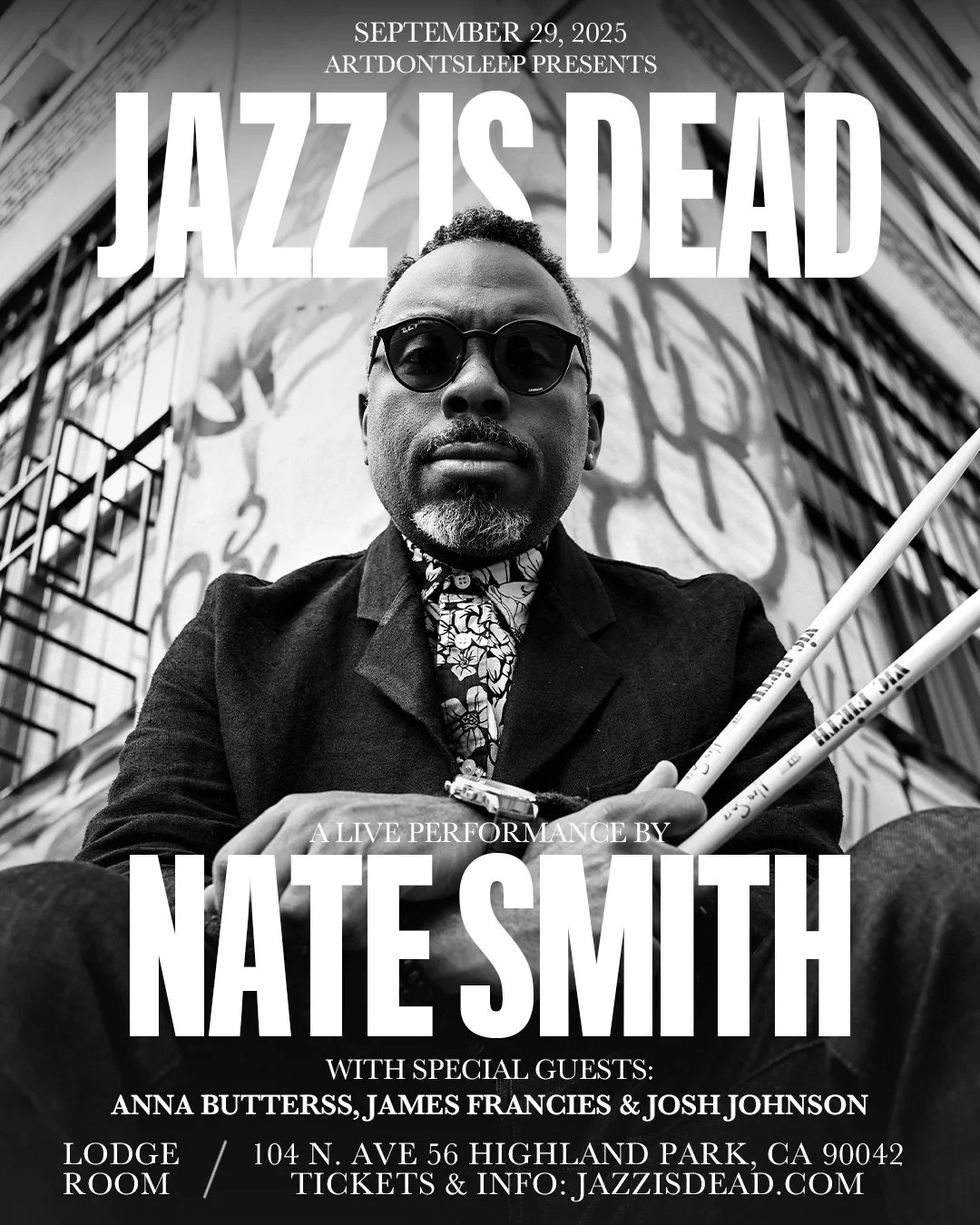
NATE SMITH
Nate Smith is a drummer, composer, & producer from Chesapeake, Virginia. His visceral, instinctive, and deep-rooted style of drumming and his talent as a composer and arranger has led to three GRAMMY® nominations and work with esteemed artists, including: Pat Metheny, Dave Holland, Brittany Howard, Van Hunt, The Fearless Flyers, Norah Jones, Childish Gambino, Jon Batiste, and Somi. Smith fuses his original compositions with an eclectic mix of music, including everything from jazz to R&B to hip-hop to pop. In recent years, Smith’s viral videos have been viewed by millions of people, underscoring his popularity as one of the most influential drummers of his generation.
This will be Nate’s third time performing live at Jazz Is Dead and we can’t wait to see what he brings to the stage this time around!
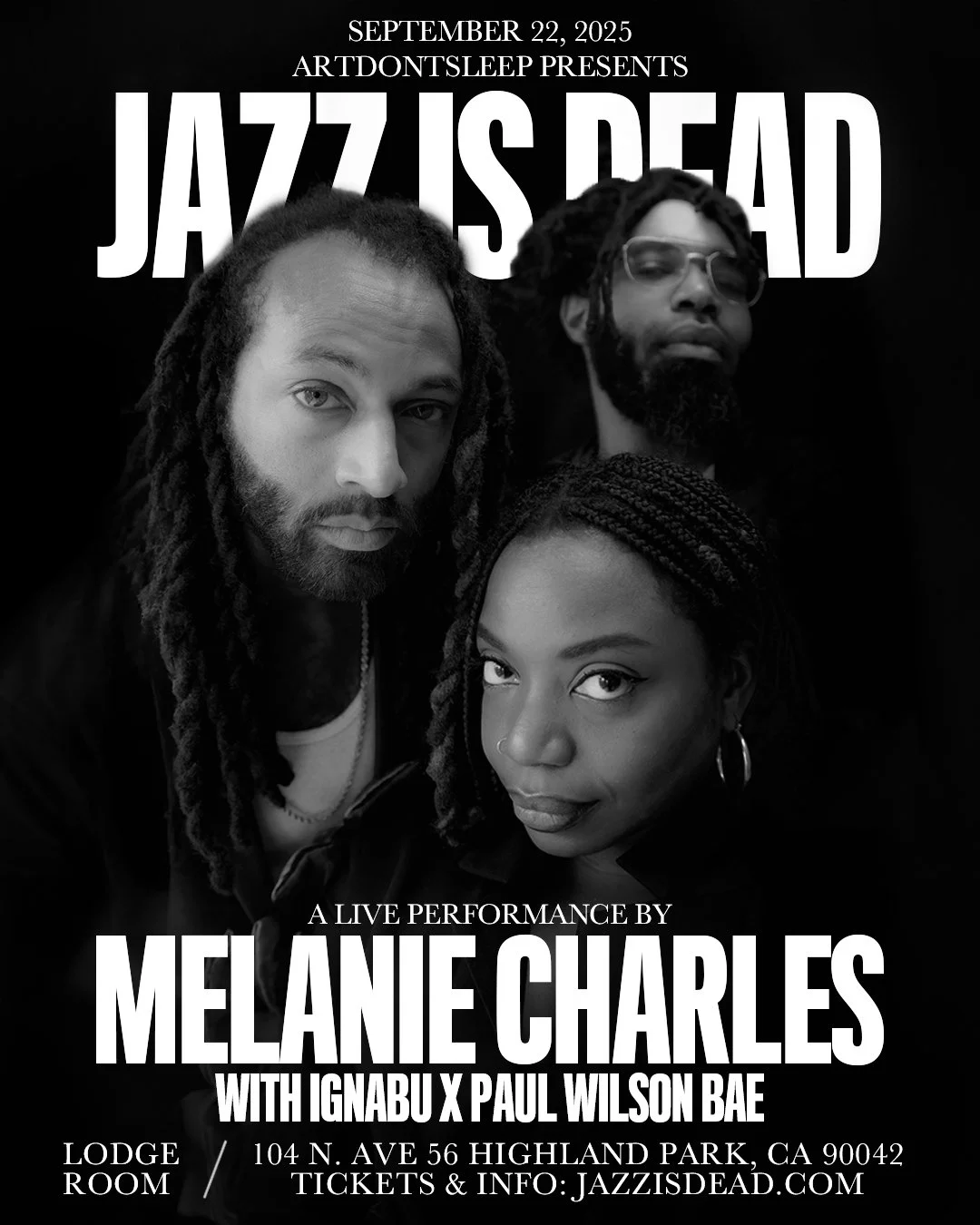
Melanie Charles with IGNABU x Paul Wilson Bae
Melanie Charles with Ignabu and Paul Wilson Bae is a collective of 3 New York Natives who came together in 2019 to record a rehearsal for a performance at the 41st annual Wall to Wall concert series at Symphony Space, spotlighting all things Rev John Coltrane. The trio curated a body of work exploring his legacy via found footage, interviews and samples of his contemporaries to create a 4 movement ceremony. The pre-pandemic concert and recording coincided with the untimely passing of prolific drummer Lawrece Leathers setting a tone of reverence for the musicians that tirelessly explored the possibilities of this music. The recording was never intended to be released to the public but as time has gone by, this musical artifact serves as a conversation with our musical ancestors while discovering new modes.
Melanie Charles
“Melanie Charles takes us on a journey that embodies the soul of jazz: exploration.” —NPR
There are very few artists whose sound can capture the sentiments of a generation. The Brooklyn born and raised, Melanie Charles, is one of these artists. Over the past few decades, she has made a name for herself through dynamic engagements with jazz, soul, and R&B. Her bold genre-bending style has been embraced by a range of artists including Wynton Marsalis, SZA, Mach-Hommy, Gorillaz, and The Roots. In 2021, she appeared on NPR’s Tiny Desk and stunned with her eclectic style. Through it all, she has remained committed to making music that pushes listeners to consider new possibilities—both sonically and politically. “Make Jazz Trill Again,” a project that she launched in 2016, demonstrates her allegiance to everyday people, especially the youth and is focused on taking jazz from the museum to the streets. “I love jazz, I really fell in love with it deeply. But I was interested in young people interacting with it,” Charles says. The album Y’all Don’t (Really) Care About Black Women is reflective of Charles’ tremendous versatility and imagination as an artist but of also her deep care for community.

NOVOS BAIANOS TOUR
For the first time EVER, Os Novos Baianos are making the trip from Brasil to light the Jazz Is Dead stage on fire across the United States and Mexico. How the gods of Samba Rock and the pioneers of Brasilian fusion have kept North America waiting this long is a wonderful mystery — but we’re not about to miss it now! Acabou Chorare, their second album, was named by Rolling Stone #1 of the 100 greatest Brasilian albums of all time — and for good reason. From start to finish, this Brasilian gem is a rich, wild ride — a perfect blend of rock, samba, frevo and choro — a record you simply do not skip.
The story of Os Novos Baianos traces back to the rich musical scene of Salvador, Bahia in the late 1960s. It all started with Paulinho Boca de Cantor (vocals, pandeiro), Moraes Moreira (vocals, violão), Baby Consuelo — now Baby do Brasil — (vocals, percussion), and Luís Galvão (lyricist). Pepeu Gomes and his brother Jorginho were members of Os Leifs, a young psychedelic band who crossed paths with the future Novos Baianos in a twist of fate at the 1969 Barra 69 show alongside Gilberto Gil and Caetano Veloso. That encounter blossomed into a musical marriage — Os Leifs teamed up with Os Novos Baianos, adding bassist Dadi to the fold and taking their rich rhythms, wild guitars and soulful vocals to a whole new level.
During the years of Brasil’s military dictatorship, their communal lifestyle, their musical fusion, and their rebellious spirit made Os Novos Baianos a symbol of resistance and creativity. Living together first in Botafogo and then on a ranch in Jacarepaguá, the group challenged conformity and fought back through their art — turning their home into a refuge for freedom, collaboration, and hope in the face of oppressive regimes.
The band broke up in 1978, with its members pursuing successful solo careers — but nearly 60 years after their formation, Os Novos Baianos are boarding a plane to North America for the first time in their rich history. Get ready to experience their unique fusion of Rock, Samba, MPB and Brasilian folklore — a once-in-a-lifetime moment brought to you by ArtDontSleep at Jazz Is Dead. Be sure to grab your tickets while they last.

GYEDU-BLAY AMBOLLEY TOUR
For the first time in the US, Gyedu Blay Ambolley will be performing his 1975 debut album Simigwa in its entirety! Bringing his 8 piece band from Ghana, they will perform the pioneering masterpiece.
Gyedu Blay Ambolley is a musical luminary hailing from Ghana, West Africa, with a staggering 29 albums under his belt. Known affectionately as the "Simigwa Do Man,” Ambolley’s musical journey began in the vibrant port city of Sekondi-Takoradi, in the Western Region of Ghana. His early fascination with music blossomed into a lifelong passion. From mastering his father’s flute at the tender age of eight, to honing his guitar skills under the mentorship of “Uncle Bonku”, Sammy Lartey and Ebo Taylor, Ambolley’s musical odyssey has been nothing short of extraordinary. This all led to Ambolley becoming a musical life force and exploding on the scene in 1973 with a jazzy highlife sound called 'SIMIGWA-DO'. His name has become synonymous with Simigwa music and dance.
Coming of age amidst the zenith of Ghana’s highlife era, Ambolley emerged as a pivotal figure in its evolution, lending his talents to esteemed bands such as Houghas Extraordinaires, Meridians Of Tema and Ghana Broadcasting Band. It was during this time that he caught the attention of his compatriot and friend, Ebo Taylor, who recruited Ambolley to be a member of the Uhuru Dance Band. This all lead to a transformative journey to Nigeria in 1973, where they shared the stage with the legendary Fela Kuti at his renowned Shrine venue.
1975 Debut Album Simigwa:
Gyedu Blay Ambolley’s groundbreaking debut solo album, released in 1975, stands as a cornerstone of Ghanaian music history - with one of the most iconic album covers! Simigwa stands as Ambolley’s magnum opus, a masterpiece fusing together the rich tapestry of highlife, afrobeat, folk and funk. The album is a true testament to Ambolley’s unparalleled artistry written and produced in collaboration with the legend Ebo Taylor.
Ambolley not only embraces his musical roots but also pioneers the fusion of Ghanaian highlife with soul and funk influences from across the Atlantic. With Simigwa, Ambolley seized the opportunity to showcase his own musical prowess and embark on a journey of experimentation. A main inspiration for this album was the work of the mighty Mr. James Brown, something that is evident from the rhythm section, horns, vocal stabs and percussion breaks throughout the record.
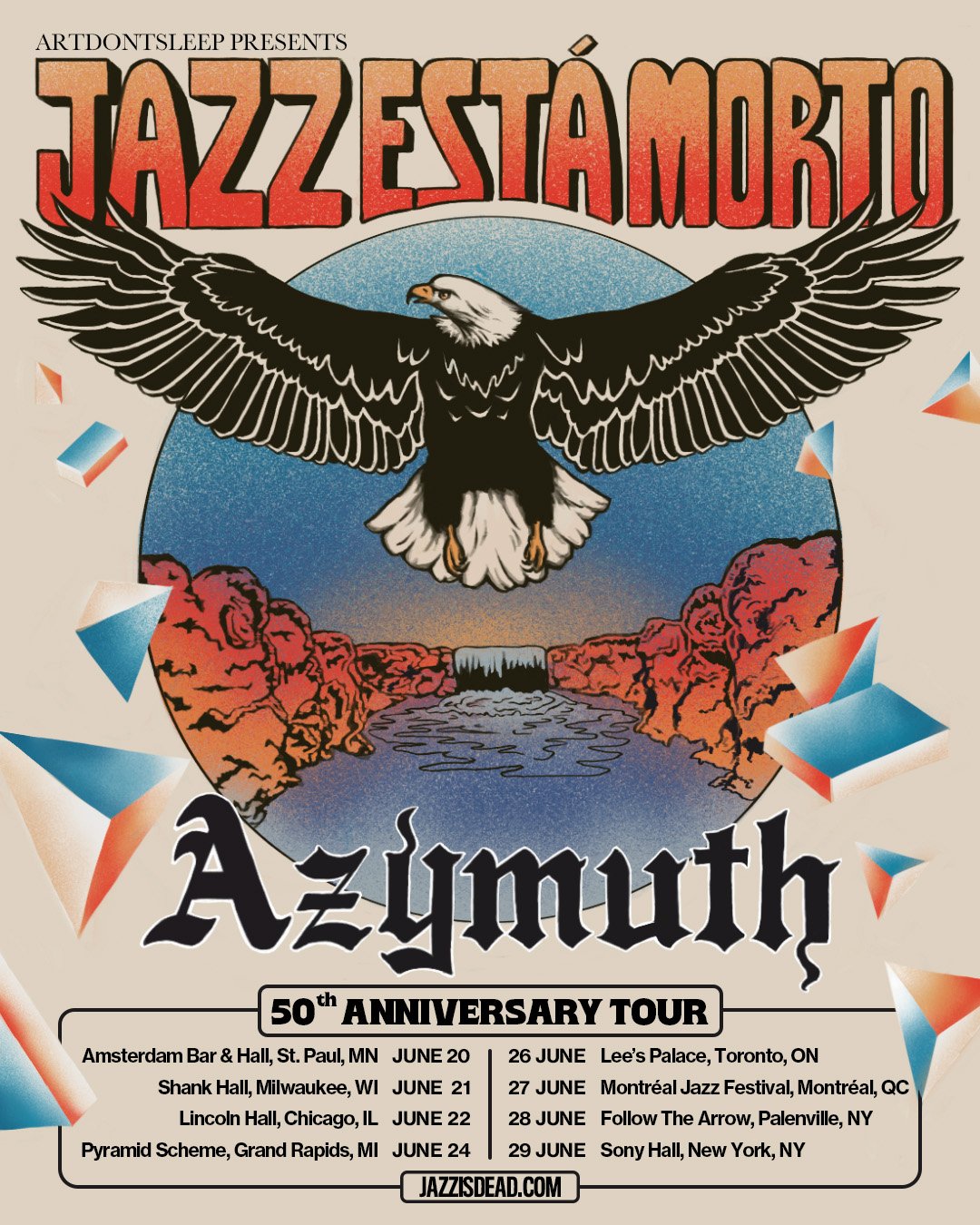
AZYMUTH 50TH ANNIVERSARY TOUR
Responsible for carving out an entirely new sound, fusing jazz-funk with samba to create their own unique genre, referred to as ‘samba doido’, Azymuth are one of Brazil’s most influential bands and surely one of the world’s longest running.
They have played with just about everyone throughout Brazil’s golden era of MPB, jazz, soul and funk, including Jorge Ben, Milton Nascimento, Tim Maia, Elis Regina and Marcos Valle to name just a few. It was Marcos Valle who gave Azymuth their name in 1973 during the recordings of his soundtrack for the film O Fabuloso Fittipaldi. In that same year, Azymuth began recording their now critically acclaimed Demos (1973-75) which sat in their archives until 2019 when they were released by London based label Far Out Recordings.
50 years since they began, Azymuth have released over thirty albums and are still going as strong as ever, writing, recording and performing with the same energy and enthusiasm as when they started out.
As well as their influence on jazz and funk, Azymuth’s contribution to electronic music around the globe is unquestioned, and they’ve collaborated with the likes of 4hero, Madlib and Jazzanova, and been remixed by Theo Parrish, Ron Trent, Global Communication and Daniel Maunick amongst others.
Since the passing of keyboard maestro Jose Roberto Bertrami in 2012 and drummer Ivan Conti in early 2023, remaining original member Alex Malheiros has worked tirelessly to keep the spirit of Azymuth alive, enlisting keyboardist Kiko Continentino (Milton Nascimento, Gilberto Gil, Djavan), who co-wrote and recorded Azymuth’s critically acclaimed 2016 album Fenix, and drummer Renato Massa (Marcos Valle, Ed Motta).
An Azymuth live show is a journey through the full spectrum of their brilliantly coloured expressionist funk, with all the cosmic energy and masterful musicianship you’d expect from the world's greatest three-man orchestra.

ADRIAN YOUNGE LIVE AT SUMMER FOR THE CITY
His work pulses with deep intention, blending the raw grit of vintage soul with the grandeur of orchestral arrangements. Now, he’s bringing his most ambitious project yet—Something About April III—to life with a 35-piece orchestra and special guests, performing not just the new album but also selections from the first two volumes of the April trilogy. A decade and a half in the making, this final installment cements Younge’s legacy as a leading expert of psychedelic soul and orchestral storytelling. Kicking off the night is none other than J.Rocc, founder of the legendary Beat Junkies, setting the tone with an opening DJ set. This is more than a concert—it’s a moment in music history. Be there to witness it first

ADRIAN YOUNGE: SOMETHING ABOUT APRIL TOUR
Adrian Younge performs his psychedelic soul trilogy Something About April with a 10 piece orchestra. Hear Younge's classics and more from Something About April to his recent release, São Paulo.
“The Something About April Tour is the show I've always dreamed of bringing to life. Fifteen years in the making, the Something About April trilogy is my magnum opus; a body of work designed for the most cinematic and live experience.” - Adrian Younge
SOMETHING ABOUT APRIL I
The first installment in the Something About April trilogy set the standard for everything that has made Adrian Younge an in-demand composer. Younge became the sample source-point for many of hip hop's most acclaimed artists including Jay-Z, DJ Premier, Common and more.
Younge's live performance oozes raw, analog soul and the primal sonic edge of psychedelic rock, sitting nicely alongside Ennio Morricone’s best soundtrack work or Pink Floyd’s early catalog. LISTEN NOW
SOMETHING ABOUT APRIL II
Something About April II synthesizes the boundaries between dark American soul and classic European cinema. The album features an array of entrancing vocalists: Laetitia Sadier (Stereolab), Bilal, Raphael Saadiq, Loren Oden and Israeli star, Karolina who delivers haunting chants over concertos.
Younge is the experimental spirit of the modernist vanguard, looking into the past to create the future. LISTEN NOW
SOMETHING ABOUT APRIL III
"Something About April III is the album I wanted to make when I created the first album in 2011. However, I didn’t have the musical knowhow and experience to create the sound that was buried deep in my soul. Essentially, SAA III is the album that has taken me fifteen years to uncover and fully realize. From a cratediggers’ perspective, it’s the album I’ve been diggin’ for in the deepest crates of my soul. A lost album I finally found. I hope this LP resonates with you as much as it has for me.” - Adrian Younge LISTEN NOW
Adrian Younge is an Emmy Award winning composer, multi instrumentalist, and producer from Los Angeles, CA. Renowned for his analog sound, Younge has been sampled by artists like Jay-Z, Kendrick Lamar, Common, DJ Premier, Alchemist and countless others. He’s also produced for icons including Snoop Dogg, Cee Lo, Rakim, Tony Allen, Ebo Taylor, Samantha Schmutz, Marcos Valle, Céu, Azymuth, Dom Salvador, Roy Ayers, Wu Tang Clan, The Delfonics and many more. He’s also known for his work as a film and television composer (Marvel’s Luke Cage, Black Dynamite, etc.) Younge is the founder and brainchild of the record label Linear Labs; he also is the co-founder of the record label and events company Jazz Is Dead.
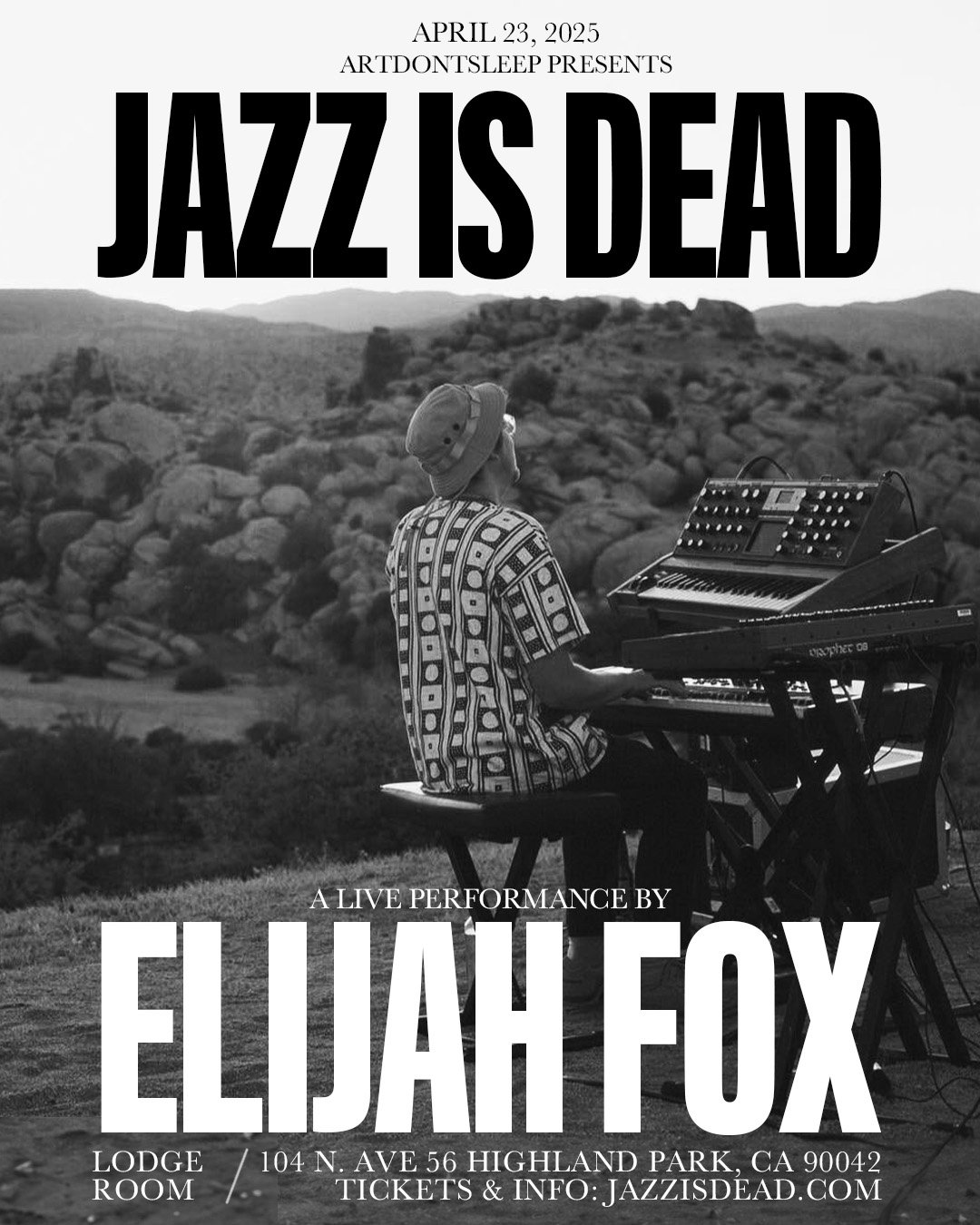
Elijah Fox
Watching Elijah Fox live, you're likely to experience something new. From silky R&B tracks and spacey synth jams to old-timey stride piano covers and soulful improvisations, Elijah's talent spans genres and styles, yet all of his music is imbued with a single unifying element: impressionism. For Elijah, that means striving to make every moment evoke powerful emotional reactions in his listener, and yet also remain open to pensive wandering.
Elijah Fox is a multi-instrumentalist, singer, and producer based in Los Angeles, CA. He grew up in Durham, NC and began playing piano at age 11 and was mentored early on by Yusuf Salim, a pianist who had played with Charlie Parker and began performing in local jazz clubs. Fox studied piano at Oberlin Conservatory with Sullivan Fortner, Billy Hart, Dan Wall, and Gary Bartz and graduated in 2017 before moving to New York City. His piano composition “East Village” was sampled by Drake and 21 Savage on “Major Distribution” reaching number 3 on the Billboard Charts. Fox has also recorded/produced for SZA, Masego, YG, ScHoolboy Q, Denzel Curry, Tate McCrae, Musiq Soulchild, Childish Gambino, Kali Uchis, J Cole, and many others as well as releasing his own original compositions and sample packs. His impressionistic original piano composition “Wyoming” went viral on TikTok and has received over 20 million streams on Spotify. He is signed to UMPG for publishing as a writer/composer. He is also the touring keyboardist for UK drummer Yussef Dayes and has performed throughout the world. Fox has also performed his original music at sold out shows across the US and Europe. His sound blends elements of jazz, Impressionism, and psychedelic soul. Fox also releases instrumental music under the alias @SorenSostrom.
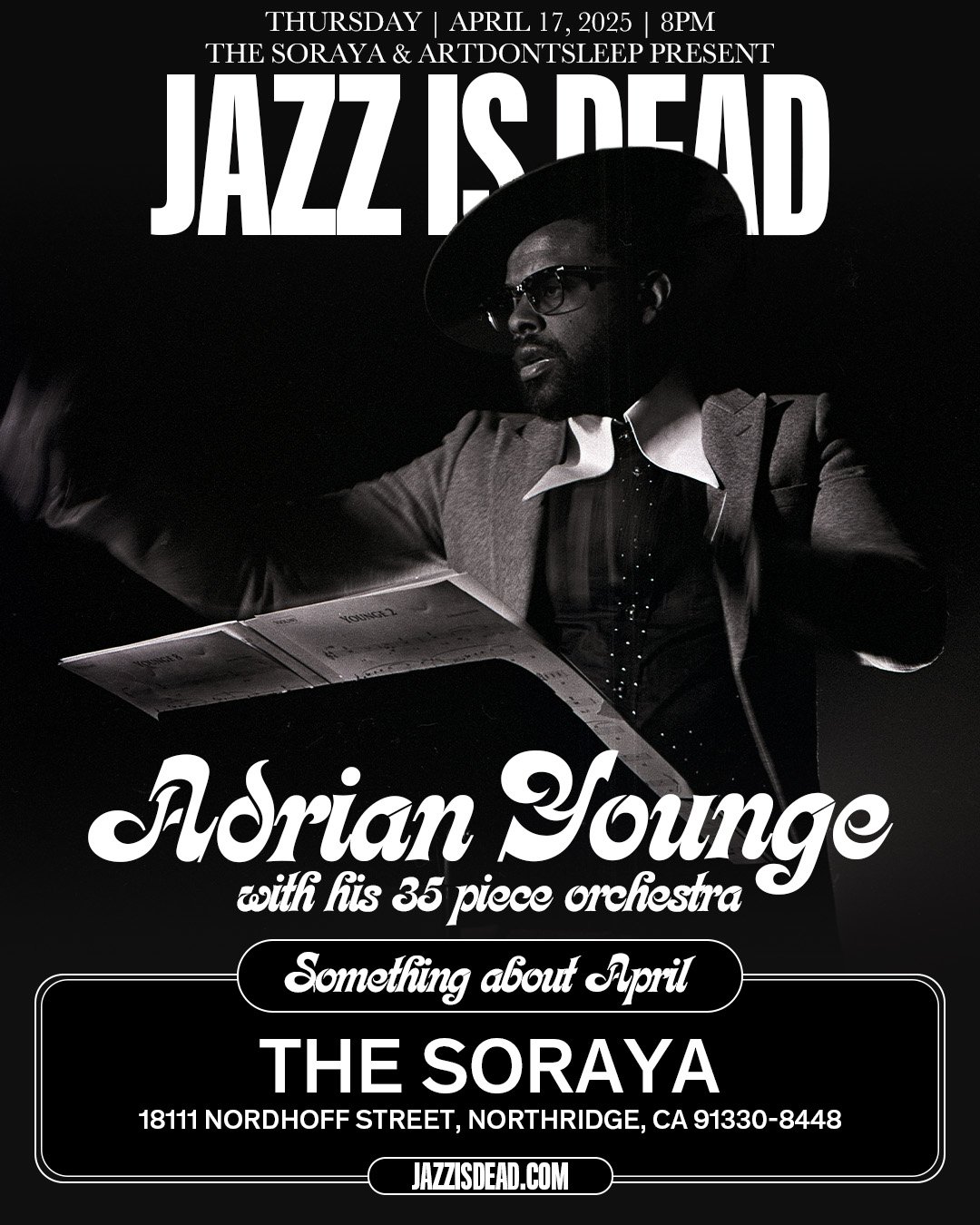
ADRIAN YOUNGE LIVE AT THE SORAYA
Adrian Younge will perform his psychedelic soul trilogy Something About April with a 35 piece orchestra at the beautiful The Soraya stage at CSUN!
“The Something About April Tour is the show I've always dreamed of bringing to life. Fifteen years in the making, the Something About April trilogy is my magnum opus; a body of work designed for the most cinematic and live experience.” - Adrian Younge
SOMETHING ABOUT APRIL I
The first installment in the Something About April trilogy set the standard for everything that has made Adrian Younge an in-demand composer. Younge became the sample source-point for many of hip hop's most acclaimed artists including Jay-Z, DJ Premier, Common and more.
Younge's live performance oozes raw, analog soul and the primal sonic edge of psychedelic rock, sitting nicely alongside Ennio Morricone’s best soundtrack work or Pink Floyd’s early catalog. LISTEN NOW
SOMETHING ABOUT APRIL II
Something About April II synthesizes the boundaries between dark American soul and classic European cinema. The album features an array of entrancing vocalists: Laetitia Sadier (Stereolab), Bilal, Raphael Saadiq, Loren Oden and Israeli star, Karolina who delivers haunting chants over concertos.
Younge is the experimental spirit of the modernist vanguard, looking into the past to create the future. LISTEN NOW
SOMETHING ABOUT APRIL III
"Something About April III is the album I wanted to make when I created the first album in 2011. However, I didn’t have the musical knowhow and experience to create the sound that was buried deep in my soul. Essentially, SAA III is the album that has taken me fifteen years to uncover and fully realize. From a cratediggers’ perspective, it’s the album I’ve been diggin’ for in the deepest crates of my soul. A lost album I finally found. I hope this LP resonates with you as much as it has for me.” - Adrian Younge LISTEN NOW
Adrian Younge is an Emmy Award winning composer, multi instrumentalist, and producer from Los Angeles, CA. Renowned for his analog sound, Younge has been sampled by artists like Jay-Z, Kendrick Lamar, Common, DJ Premier, Alchemist and countless others. He’s also produced for icons including Snoop Dogg, Cee Lo, Rakim, Tony Allen, Ebo Taylor, Samantha Schmutz, Marcos Valle, Céu, Azymuth, Dom Salvador, Roy Ayers, Wu Tang Clan, The Delfonics and many more. He’s also known for his work as a film and television composer (Marvel’s Luke Cage, Black Dynamite, etc.) Younge is the founder and brainchild of the record label Linear Labs; he also is the co-founder of the record label and events company Jazz Is Dead.
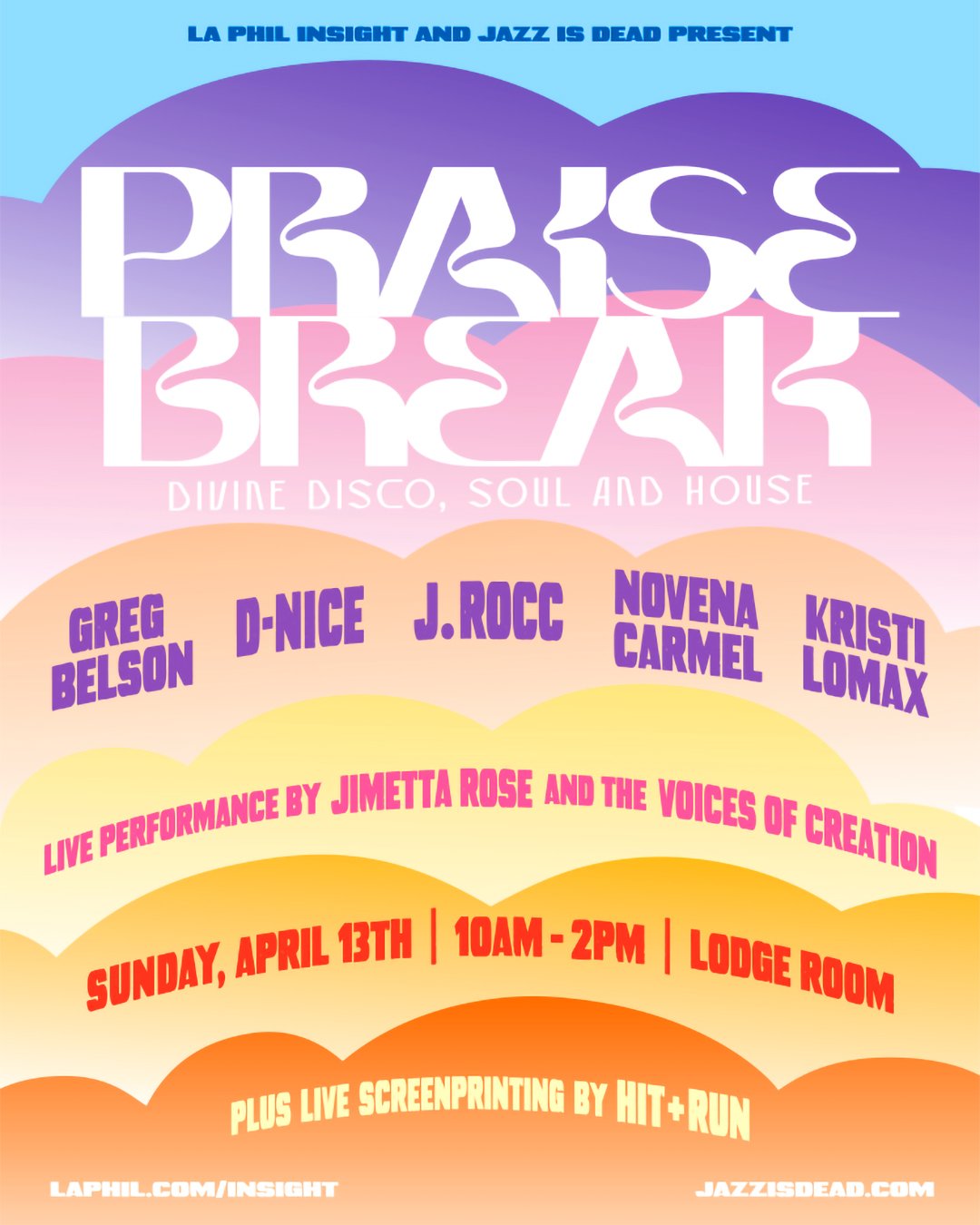
Praise Break: Divine Disco, Soul and House
Praise Break celebrates Black gospel culture through music and dance, blending gospel, soul, disco, and house. It is part of "The Trinity," a three-part program by NOMMO for the LA Philharmonic's premiere performances of Carlos Simon's Good News Mass. The program explores the themes of Black joy, spiritual exploration, and the power of faith, inviting audiences to connect with Los Angeles' rich gospel music heritage. Experience the soul-stirring rhythms and uplifting spirit of the city's gospel traditions.
DJ sets by D-Nice, Greg Belson, J. Rocc, Novena Carmel, Kristi Lomax, and more
Live performance by Jimetta Rose and the Voices of Creation
Brunch will be served in Checker Hall with DJs playing deep gospel cuts
Live screen-printing by HIT+RUN
All ages welcome. $10 tickets for the main room and free entry to Checker Hall.
Complimentary custom-printed t-shirts for each attendee while supplies last.
Curated by Tyree Boyd-Pates of NOMMO Cultural Strategies
LA Phil Insight is generously supported by Linda and David Shaheen.
Explore more at laphil.com/insight
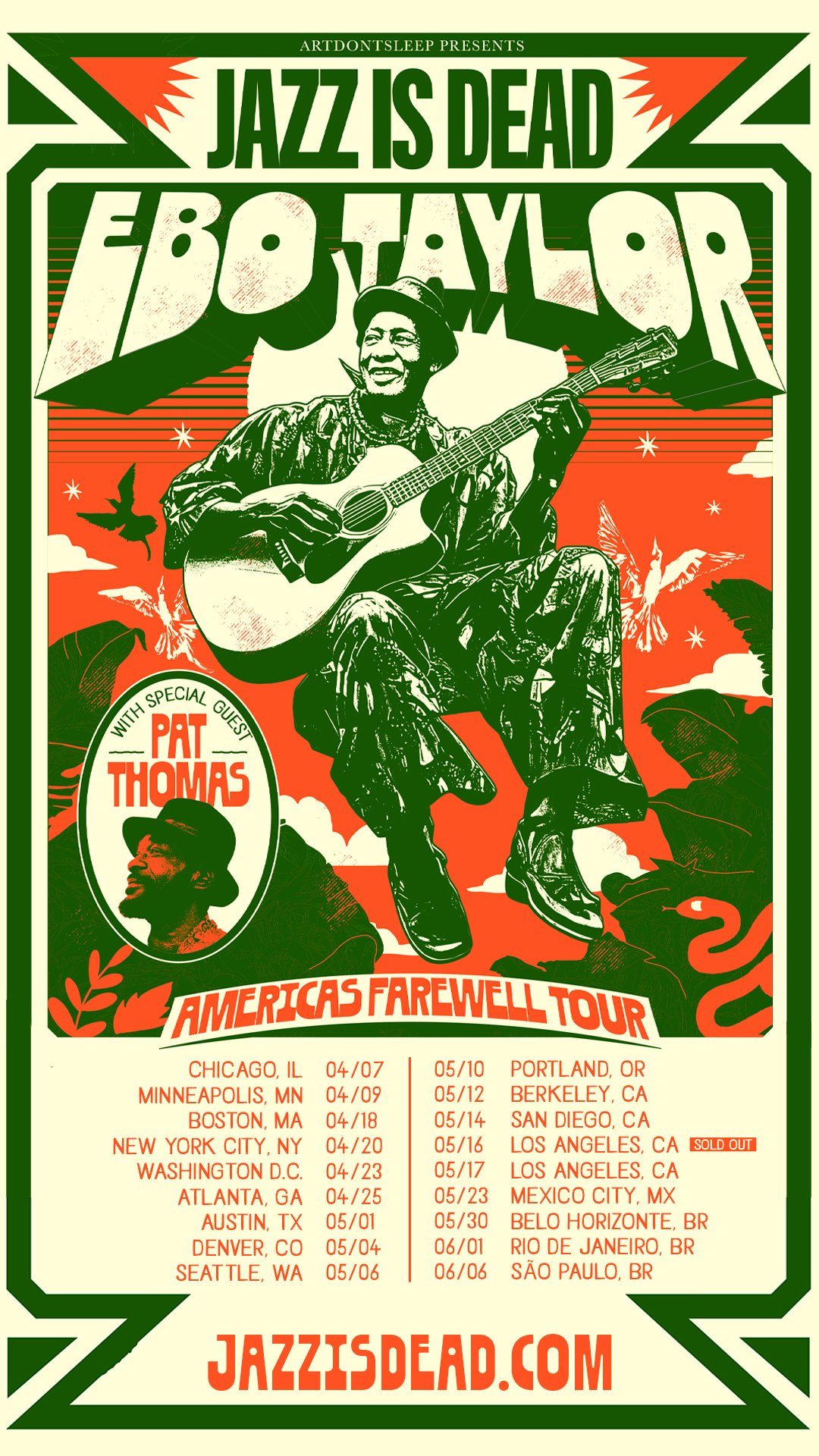
EBO TAYLOR FAREWELL TOUR
Ebo Taylor and his family have decided to make this tour his official farewell to the Americas. This will be our final opportunity to honor the legendary maestro, the pioneer of highlife and father of Afrobeat, and give him his flowers.
If you've already purchased tickets - Your current tickets remain valid for the new date, and no further action is required—just hang on to them! If you have any questions or need assistance with ticket options, feel free to reach out to your point of purchase.
If you have not yet purchased tickets, please see dates and cities below. We would love for you to join us and be a part of this very historic moment when Ebo Taylor, one of Africa's most influential, artists, says his farewell to the Americas.
Ebo Taylor Bio
Born in 1936, Ghanaian guitarist, composer, arranger, bandleader, and producer Ebo Taylor has been a vital presence in African music for more than half-a-century. During the early '60s, he was active in the influential highlife bands the Stargazers and the Broadway Dance Band whose singles were mainstays on national radio. In 1962 he took his Black Star Highlife Band to London and collaborated with other African musicians who were also in Britain at the time, including Fela Kuti. Back in Ghana, he worked as an influential producer, crafting recordings for Pat Thomas (his future collaborator) and C.K. Mann, among many others. During the '70s, his own musical projects combined traditional Ghanaian music with Afro-beat, jazz, and funk, creating a trademark sound as evidenced by the albums Ebo Taylor & the Pelikans (1976) and Twer Nyame (1978). In the '80s, albums such as Conflict Nkru! and Hitsville Re-Visited (co-billed to Thomas) by his Uhuru-Yenzu band delivered a rawer, more immediate sound. Over the next two decades, Taylor was a noted producer, arranger, and composer, working with Thomas, Mann, Gyedu-Blay Ambolley, Kofi Yankson, and dozens of others. He returned to performing live in the early 21st century after hip-hop producers began sampling his work. Soundways Records released the compilation Ghana Special. In 2010, Strut Records released Love and Death, his first internationally distributed album, followed by a series of catalog reissues and all-new recordings including 2018's Yen Ara.
Taylor was born in Ghana and grew up on the sounds of the wartime big bands. His father nudged him into music, by encouraging his son to learn to play the family organ. He caught the music bug and began studying guitar in school, coming under the sway of the emergent highlife movement. He would soon lead his first group, an eight-piece band named the Stargazers. In 1962, he departed his native Ghana for London to study at the London Eric Gilder School of Music. He explored jazz, funk, and soul alongside fellow student Fela Kuti and future Osibisa bandmembers Teddy Osei and Sol Amarfio. They indulged in endless jam sessions in jazz clubs off Oxford Street, after which Fela would often join Taylor in his flat in Willesden Junction. They would listen to jazz records for hours, analyzing the structure and chord progressions of Miles Davis and Charlie Parker. During his time abroad, Taylor founded the Black Star Highlife Band, which showcased one of his greatest contributions to highlife: His jazz-inspired horn arrangements.
After returning to Ghana, Taylor became an in-house arranger and producer for labels like Essiebons, working with other leading Ghanaian stars including Mann and Thomas. He was paid to write for them, play guitar on sessions, and supervise recordings. From the '70s through the '80s, Taylor cut a host of his own solo albums that offered idiosyncratic but very popular fusions of traditional Ghanaian sounds, Afrobeat, jazz, soul, and funk on albums such as My Love and Music, Twer Nyame, and Me Kra Tsie. His single "Heaven" from this period stands among the most revered Ghanaian Afrobeat tunes of the era. Taylor formed Uhuru-Yenzu in 1980 and released the albums Conflict Nkru! Nsamanfo: People's Highlife, Vol. 1, and Hitsville Re-Visited (the latter co-billed to Thomas). After the album Pat Thomas & Ebo Taylor in 1984, the guitarist stopped recording and touring and focused instead on producing, arranging, and composing for dozens of other artists.
In 2008, Taylor met the Berlin-based musicians of the Berlin Afrobeat Academy, including saxophonist Ben Abarbanel-Wolff. A year later, Usher sampled "Heaven" for his hit "She Don’t Know" (feat. Ludacris). In 2010, Taylor teamed with Berlin Afrobeat Academy for Love and Death on Strut Records, his first internationally distributed album. It offered re-recordings of his highlife and Afrobeat hits. Its success prompted Strut to issue the stellar retrospective Life Stories: Highlife & Afrobeat Classics 1973-1980 in the spring of 2011. In 2012, a third Strutalbum, the deeply personal Appia Kwa Bridge, appeared and showed that at 76, Taylor was still intensely creative and forceful, mixing traditional Fante songs and chants with children's rhymes and personal matters into his own sharp vision of highlife.
That record marked the beginning of a popular renaissance for Taylor around the world. Early singles and other tracks appeared on several compilations over the next few years, and in 2015, his rarest album, Ebo Taylor & the Pelikans, got the grand reissue treatment. His early hit, the Ghana funk anthem "Come Along," made DJ playlists globally. In February 2016, at age 80, he opened the MOGO Festival's Nights with Music Greats. The gig proved to be a precursor for the deluxe reissue of his 1975 album, My Love and Music, on Mr. Bongo. In 2018, Taylor issued the album Yen Ara that saw him translating various strains of Fante music through contemporary Ghanaian highlife and experimenting with new rhythmic forms through horn-dominated compositions. At age 82, he supported it with a world tour. The following year, Mr. Bongo reissued Hitsville Re-Visited in May, while BBE Music released the Palaver album in September, that contained five unissued tracks from a (previously unknown) lost 1980 session. ~ Thom Jurek, Rovi
Pat Thomas Bio
Pat Thomas is a Ghanaian vocalist and songwriter famed for his work in the highlife bands of Ebo Taylor and his own recordings of Afrobeat and Afro-pop.
Born in Agona, in the Ashanti region, Thomas had music almost literally in his DNA, his father was a music theory instructor and his mother a bandleader. In the 1970s, he moved to Accra to join Ebo Taylor's legendary highlife band The Blue Monks; their residency at the Tip Toe Night Club is an important part of modern Ghanaian cultural history. In the later years he moved to the Ivory Coast and produced various records in Afro-beat, Afro-Latin sounds and reggae melded to funky African disco.
In 1982, he moved to London, U.K and recorded Hitsville Revisited with Taylor and the guitarist's band, Uhuru Yenzu. Thomas's first hit outside Africa was 'Asanteman' in 1985. He followed it with Highlife Greats Mbrepa a year later. In June 2015, the U.K. label Strut released his first recording in over a decade. Dubbed Pat Thomas & Kwashibu Area Band, it was recorded in Accra. It placed the singer in the company of a band assembled by multi-instrumentalist Kwame Yeboah and saxophonist Ben Abarbanel-Wolff. Other musicians included drummer Tony Allen, Noble Kings' bassist Ralph Karikari, and a host of younger players including Thomas' daughter Nanaaya, a celebrated vocalist in her own right.
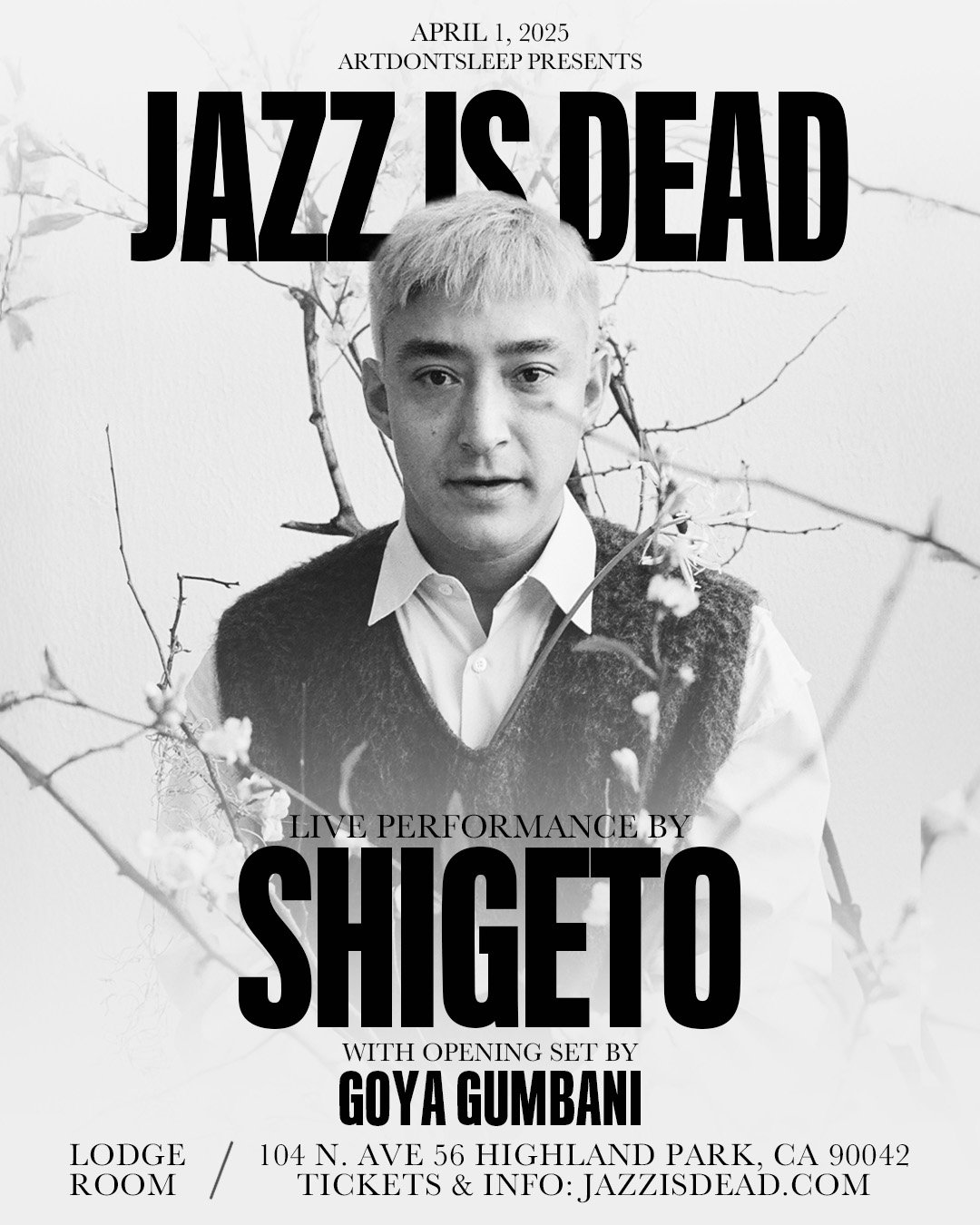
Shigeto
Shigeto releases new album, Cherry Blossom Baby, with focus track, Nothing Simple...
The Michigan-born drummer, producer and DJ's new album honors traditions in electronic, jazz, R&B, and hip-hop. A celebration of scene vitality rooted in Detroit's new wave, including guests such as Zelooperz, KESSWA, Ahya Simone, Tammy Lakkis, and more.
“Cherry blossoms remind me of my mother and grandmother's steadfast nature to look towards the light and the strength in 'acting as one'. The cherry blossom trees that bloom every spring in Hiroshima are an enduring image of hope, resilience, and renewal. Even through the most turbulent of times. Cherry Blossom Baby was literally ‘impossible’ to make without every single person involved. It started in 2018 and was finished in 2024. A manifestation of our shared experiences of pain, struggle, hope and growth over the past 6 years and a true testament to the power of ‘togetherness’." - Shigeto
Cherry Blossom Baby, Shigeto's first full-length statement since 2017, sprouts out from a collective thaw, ambitious, collaborative, and fully realized. The Detroit-based, Japanese-American musician, DJ, Portage Garage Sounds label co-founder, and long-time Ghostly International artist embraces the role of producer and composer. Bold and cultivated with intention, the band-built sound honors traditions in electronic, jazz, R&B, and hip-hop, a fusion that's become his signature, now more vibrant than ever. Zach Saginaw and a group of guests and players present a snapshot in time, a celebration of self-love and an expression of vitality distinctly rooted in Detroit and informed by his family’s cultural history.
"I am a cherry blossom baby," he says. "We all are cherry blossom babies, we all are resilient, we all are growing, we all will continue to."
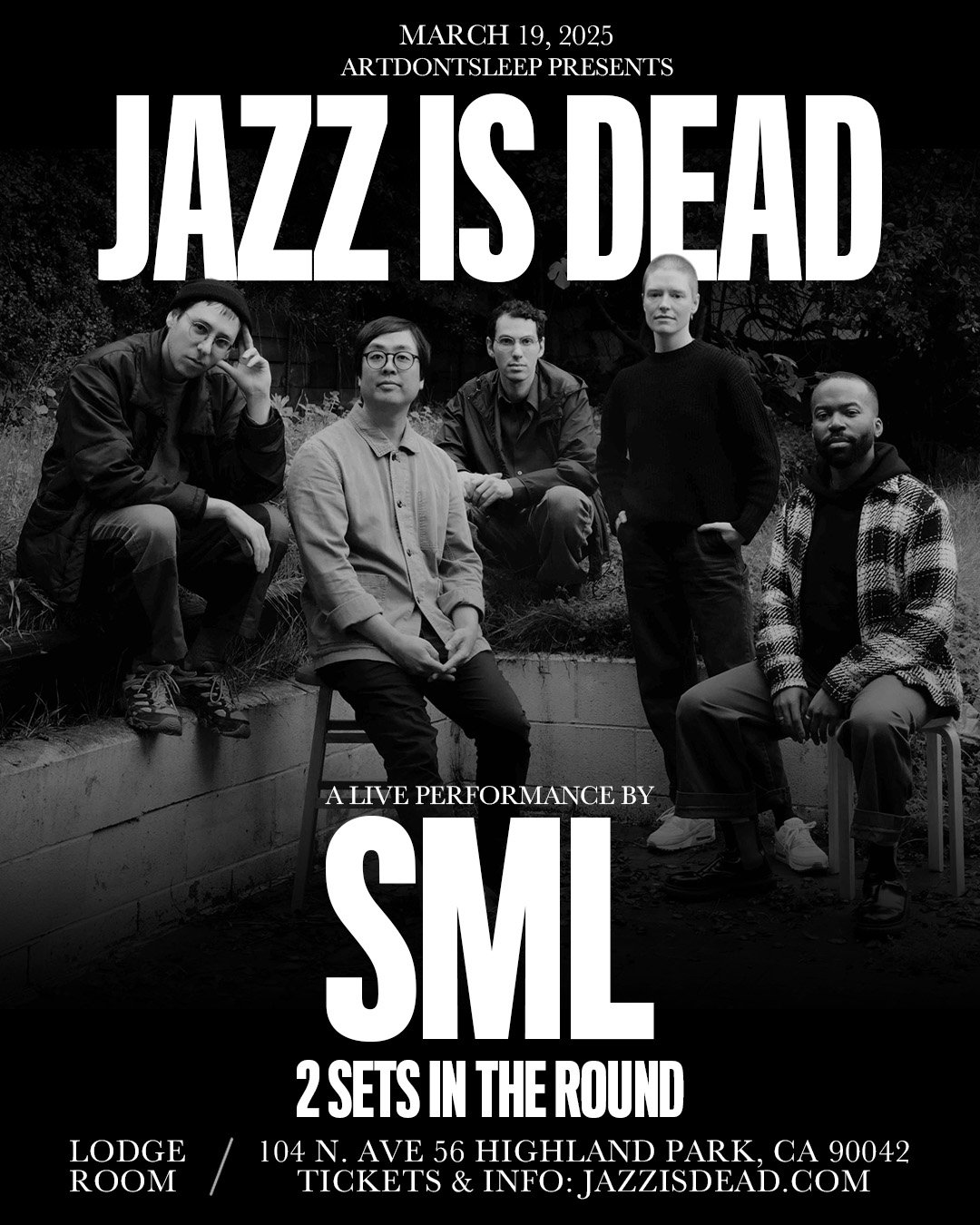
SML
SML is a new quintet composed of luminaries from Los Angeles’s thriving jazz, improvised, and indie music scenes: bassist Anna Butterss (Jason Isbell, Phoebe Bridgers, Makaya McCraven, Daniel Villarreal), synthesist Jeremiah Chiu (Ariel Kalma, Marta Sofia Honer, Icy Demons), saxophonist Josh Johnson (Meshell Ndegeocello, Leon Bridges, Carlos Niño), percussionist Booker Stardrum (Amirtha Kidambi, Lisel, Lee Ranaldo, Patrick Shiroishi) and guitarist Gregory Uhlmann (Sam Wilkes, Meg Duffy, Perfume Genius).
Their debut album Small Medium Large was engineered and recorded in stereo direct to Nagra by Bryce Gonzales at ETA, then compiled, arranged, and edited with additional production, recording, and studio composition by SML across their various home studios in 2023.
It's a sublime assemblage of circulatory grooves and textural anomalies bewitched by swirls of modular synthesis, at different moments recalling the the jagged dance-punk of Essential Logic, the rhythmic revelry of Fela Kuti, the low-end elasticity of Parliament/Funkadelic, or the glitchy dub techno of Pole. Taken in totality, the album captures a euphoric creative synchronicity between some of today's most exciting musicians.
The name, SML (or Small Medium Large), exemplifies their collective nature—five solo artists working together in different configurations amongst several groups. The collective model harkens back to a lineage established by AACM and other avant-jazz groups, but may follow a formula closer to the Dusseldorf scene in the late 60s of Kraftwerk, Harmonia, Cluster, Neu! While SML’s primary configuration is quintet, you may find them in different mixes of small, medium, large, and extra large.
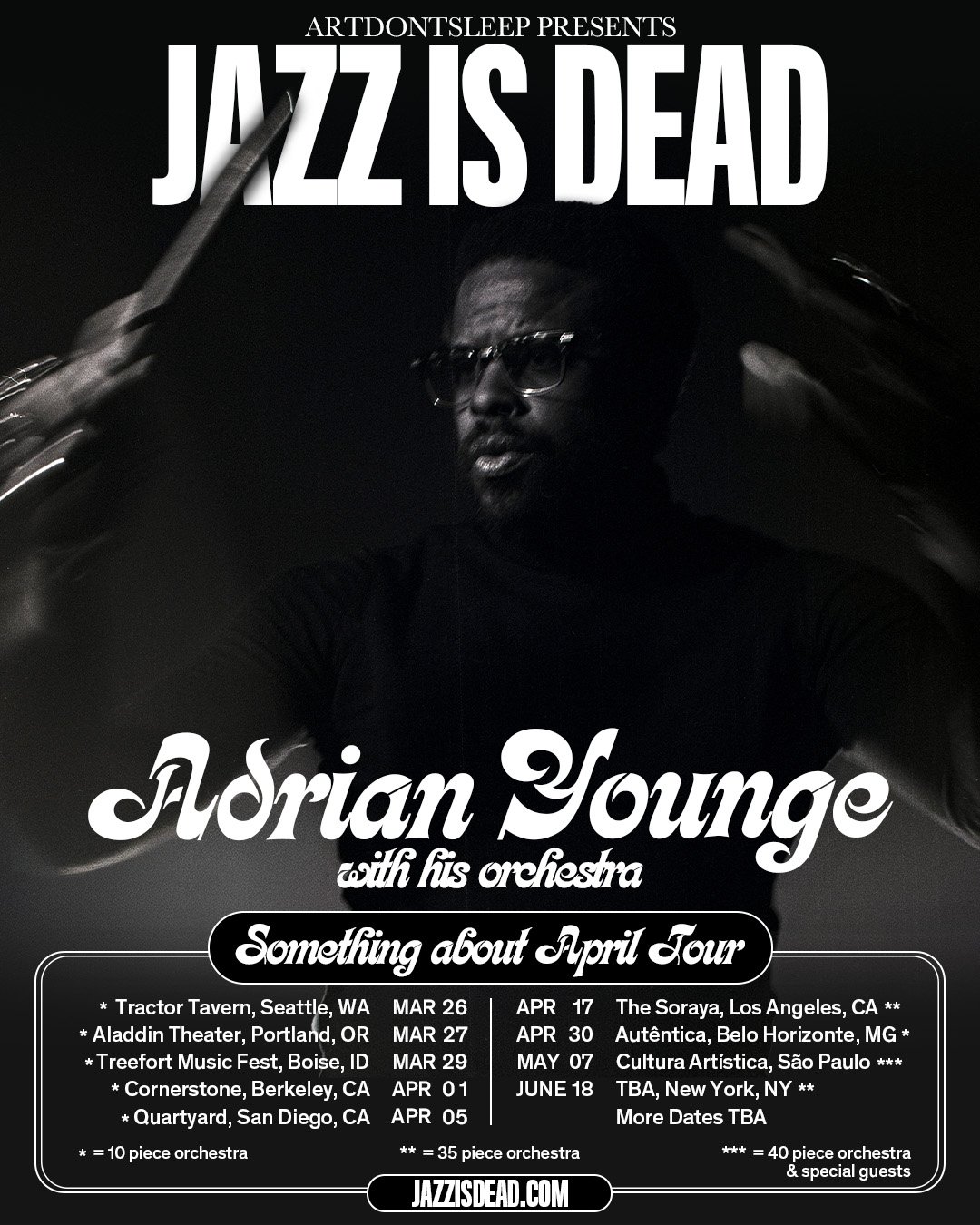
ADRIAN YOUNGE: SOMETHING ABOUT APRIL TOUR
MORE DATES TO BE ANNOUNCED!
Adrian Younge performs his psychedelic soul trilogy Something About April with a 10 piece orchestra. Hear Younge's classics and more from Something About April to his recent release, São Paulo.
“The Something About April Tour is the show I've always dreamed of bringing to life. Fifteen years in the making, the Something About April trilogy is my magnum opus; a body of work designed for the most cinematic and live experience.” - Adrian Younge
SOMETHING ABOUT APRIL I
The first installment in the Something About April trilogy set the standard for everything that has made Adrian Younge an in-demand composer. Younge became the sample source-point for many of hip hop's most acclaimed artists including Jay-Z, DJ Premier, Common and more.
Younge's live performance oozes raw, analog soul and the primal sonic edge of psychedelic rock, sitting nicely alongside Ennio Morricone’s best soundtrack work or Pink Floyd’s early catalog. LISTEN NOW
SOMETHING ABOUT APRIL II
Something About April II synthesizes the boundaries between dark American soul and classic European cinema. The album features an array of entrancing vocalists: Laetitia Sadier (Stereolab), Bilal, Raphael Saadiq, Loren Oden and Israeli star, Karolina who delivers haunting chants over concertos.
Younge is the experimental spirit of the modernist vanguard, looking into the past to create the future. LISTEN NOW
SOMETHING ABOUT APRIL III
"Something About April III is the album I wanted to make when I created the first album in 2011. However, I didn’t have the musical knowhow and experience to create the sound that was buried deep in my soul. Essentially, SAA III is the album that has taken me fifteen years to uncover and fully realize. From a cratediggers’ perspective, it’s the album I’ve been diggin’ for in the deepest crates of my soul. A lost album I finally found. I hope this LP resonates with you as much as it has for me.” - Adrian Younge LISTEN NOW
Adrian Younge is an Emmy Award winning composer, multi instrumentalist, and producer from Los Angeles, CA. Renowned for his analog sound, Younge has been sampled by artists like Jay-Z, Kendrick Lamar, Common, DJ Premier, Alchemist and countless others. He’s also produced for icons including Snoop Dogg, Cee Lo, Rakim, Tony Allen, Ebo Taylor, Samantha Schmutz, Marcos Valle, Céu, Azymuth, Dom Salvador, Roy Ayers, Wu Tang Clan, The Delfonics and many more. He’s also known for his work as a film and television composer (Marvel’s Luke Cage, Black Dynamite, etc.) Younge is the founder and brainchild of the record label Linear Labs; he also is the co-founder of the record label and events company Jazz Is Dead.
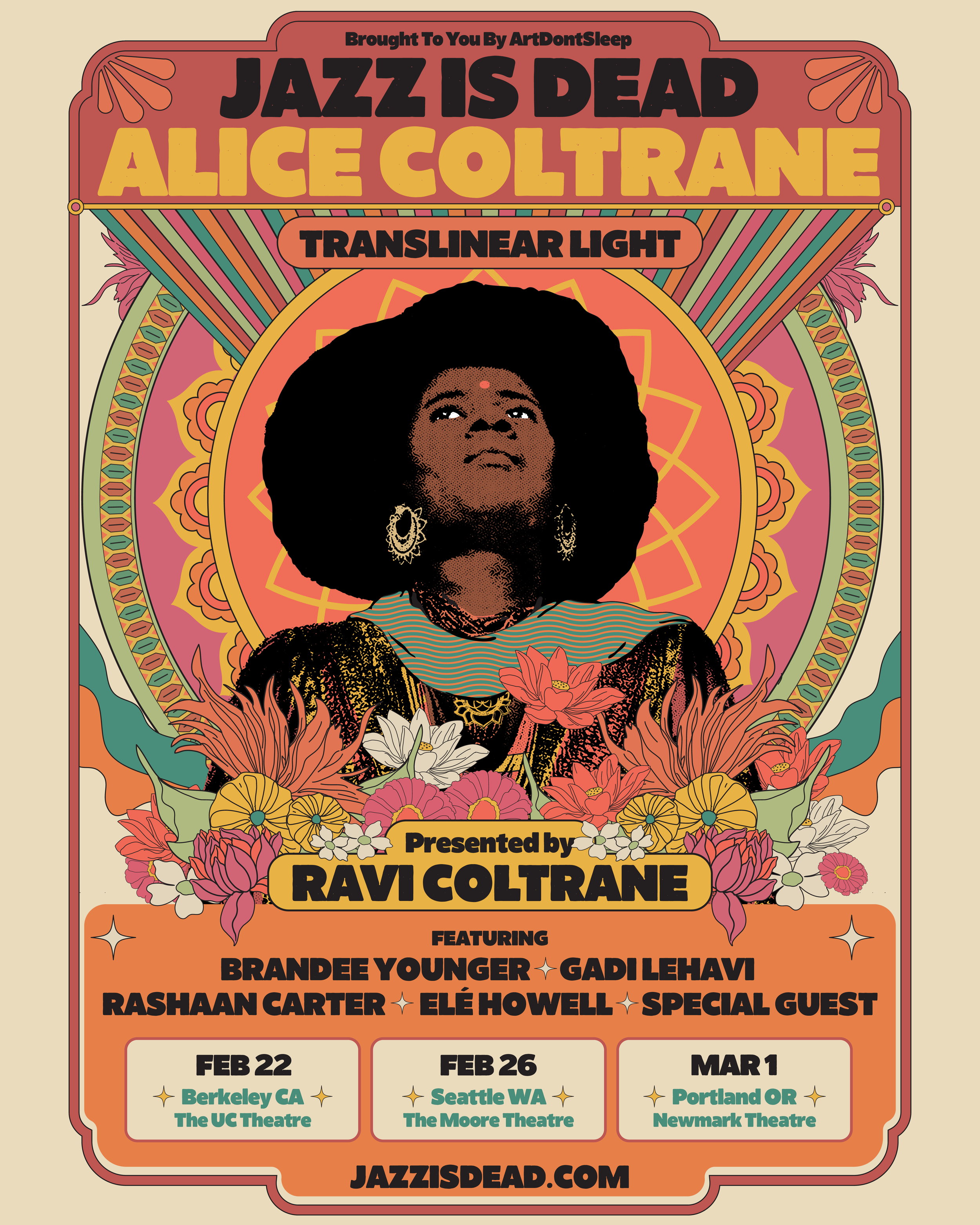
TRANSLINEAR LIGHT: THE MUSIC OF ALICE COLTRANE TOUR
We are thrilled to announce a traveling tribute to the late and great ALICE COLTRANE. Presented in partnership her son Ravi Coltrane, and loaded with special guests. This is one of those very rare opportunities to show your love and admiration for one of the greatest to ever do it. The Coltrane family continues to bless us with some of the most beautiful music the world has ever laid ear to.
ALICE COLTRANE:
Alice Coltrane Turiyasangitananda was an American jazz pianist, organist, harpist, singer, composer, swamini, and the wife of John Coltrane. Turiyasangitananda translates as the Transcendental Lord’s highest song of Bliss.
Born in Detroit, Michigan in 1937, Alice was the fifth of six children. Her interest in music blossomed in early childhood. By the age of nine, she played organ during services at Mount Olive Baptist church.In the early 60’s she began playing jazz as a professional in Detroit with her own trio and as a duo with vibist Terry Pollard. Alice would collaborate and perform with Kenny Clarke, Kenny Burrell, Ornette Coleman, Pharaoh Sanders, Charlie Haden, Roy Haynes, Jack DeJonette, and Carlos Santana. Many people are unaware that she replaced McCoy Tyner as pianist with the John Coltrane quartet and continued to play and record with the band until John’s death in 1967. Alice’s interest in gospel, classical, and jazz music led to the creation of her own innovative style. Her talents expressed more fully when she became a solo recording artist. Her proficiency on keyboard, organ, and harp was remarkable. Later her natural musical artistry matured into amazing arrangements and compositions. Her twenty recordings cover a time span from Monastic Trio (1968) to Translinear Light (2004).
Around the late 60’s, Alice entered into a most significant time in her life. As a seeker of spiritual truth, she spent focused time in isolation — fasting, praying, and meditating.
In 1970 she met a guru, Swami Satchidananda. She traveled to India, and was divinely called into God's service. Alice dedicated her life to God and came to be known as Turiyasangitananda. Alice Coltrane Turiyasangitananda became the Founder and Director of The Vedantic Center in 1975, and later established a spiritual community in the Santa Monica Mountains of Southern California. She would orate discourses and play organ to lead the members in devotional song for Sunday services.
She began recording again in 2000 and eventually issued the stellar Translinear Light on the Verve label in 2004. Produced by Ravi, it featured Coltrane on piano, organ, and synthesizer, in a host of playing situations with luminary collaborators that included not only her sons but also Charlie Haden, Jack DeJohnette, Jeff "Tain" Watts, and James Genus. After the release of Translinear Light, she played some selective dates in Paris in 2005, and a three-date tour in the fall of 2006 with Ravi in Ann Arbor, New York, and San Francisco.
RAVI COLTRANE:
Ravi Coltrane is a Grammy™-nominated saxophonist, bandleader, and composer with a 20+ year career. He has recorded notable albums, performed with legends like McCoy Tyner and Jack DeJohnette, and co-founded the independent label RKM. The son of jazz icons John and Alice Coltrane, Ravi was instrumental in bringing his mother back to music, producing her 2004 album Translinear Light. He has released six albums as a leader, with his latest, Spirit Fiction, on Blue Note. Ravi co-leads the Saxophone Summit with Joe Lovano and Dave Liebman and is actively involved in preserving the John Coltrane Home in Dix Hills, NY.
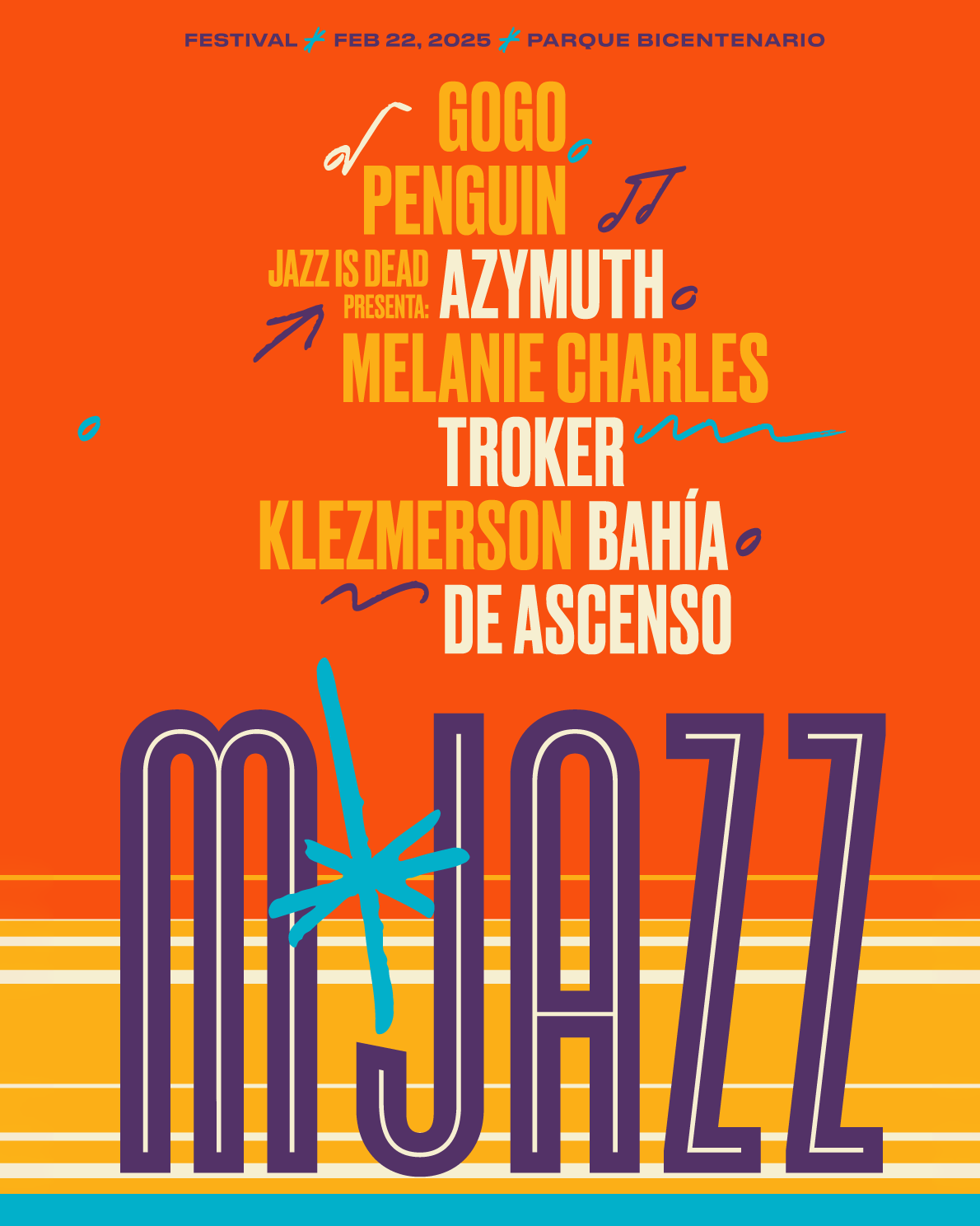
Azymuth at MJazz
Una banda adelantada a su época que por cinco décadas ha viajado a través de los límites del jazz y el funk en un vehículo de música tradicional brasileña.
El ritmo de la samba de su natal Brasil se mezcla majestuosamente con los estilos de música norteamericanos para crear un sonido animado y atemporal.
Las distintas alineaciones de Azymuth han recorrido los grandes festivales de jazz del mundo y ahora, presentados por la iniciativa Jazz is Dead, regresan a México con nueva formación pero el mismo sonido que los hizo leyendas de la música latinoamericana.
A band ahead of its time, for five decades they have journeyed through the boundaries of jazz and funk in a vehicle of traditional Brazilian music.
The rhythm of samba from their native Brazil blends majestically with North American music styles to create a lively and timeless sound.
The various lineups of Azymuth have graced the world's major jazz festivals, and now, presented by the Jazz is Dead initiative, they return to Mexico with a new formation but the same sound that made them legends of Latin American music.
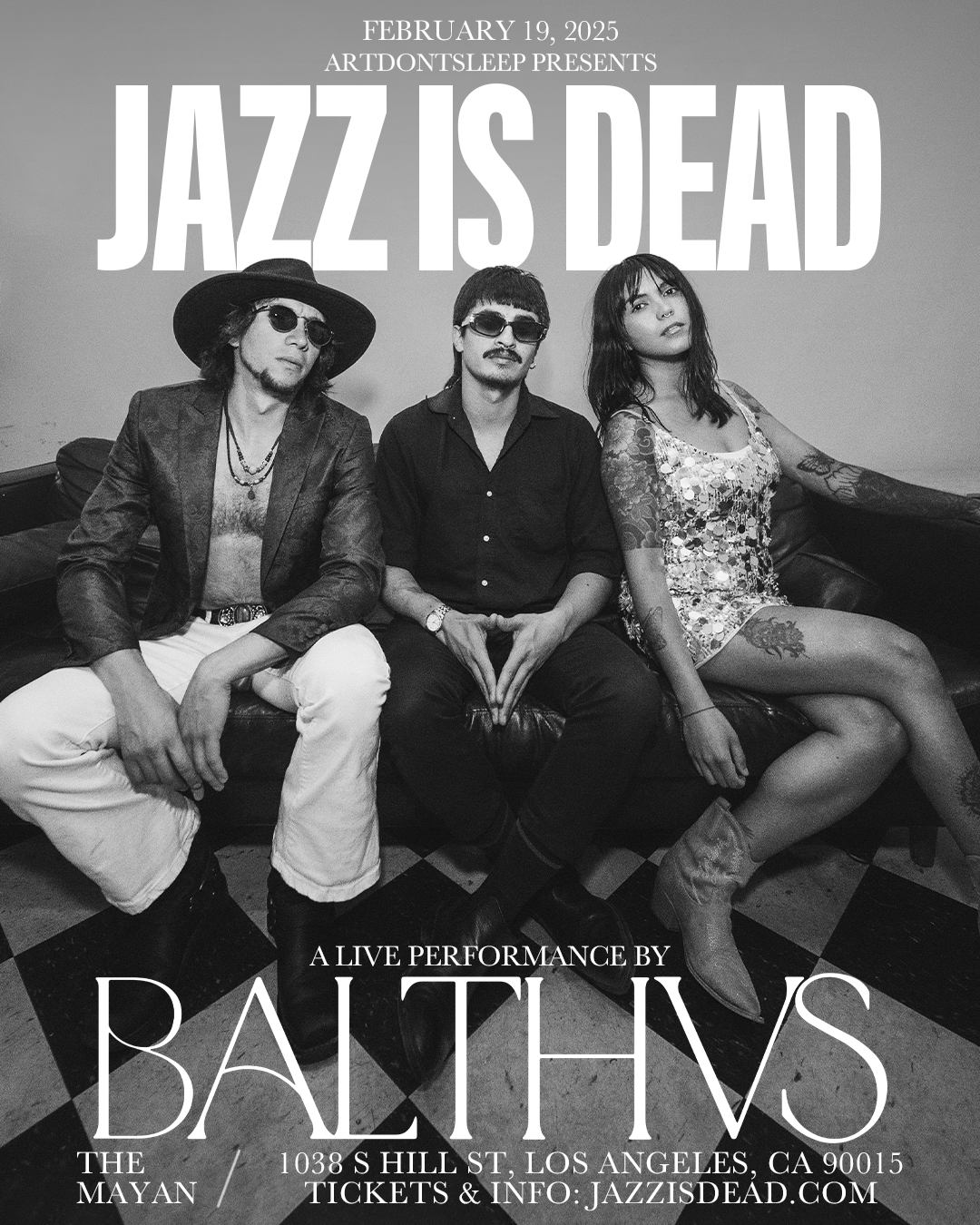
BALTHVS
BALTHVS, the Bogota, Colombia based psychedelic funk trio was formed in the countryside while the group waited out the 2020 pandemic. The band was escaping the city during uncertain times and according to Balthazar Aguirre, “we wanted the music to meld with the peaceful environment surrounding us at that moment.” Alongside Aguirre (guitar, vocals), the band consists of Johanna Mercuriana (bass, vocals) and Santiago Lizcano (drums, vocals).
Their genre-defying sound blends cumbia, surf rock, funk, and Turkish musical influences. The music is comprised of lyrics in English, Spanish and plenty of instrumentals that meld mysticism and psychedelics. “Colombia is very psychedelic, there’s plenty of availability and a lot of traditional medicine involving entheogens and plant medicine around.” The result is a captivating sonic tapestry that transcends conventional boundaries, captivating listeners with its multifaceted influences.
Known for their dynamic and electrifying live performances, BALTHVS has become synonymous with energetic shows and captivating improvisations. Since their inception, the band has embarked on a prolific creative journey, releasing an impressive catalog featuring over 34 singles and 3 full-length albums. Their music has resonated globally, amassing over 6.8 million streams worldwide, establishing BALTHVS as a formidable presence in the music industry.
While BALTHVS has conquered their home turf, gracing the stage at Colombia’s largest music festival, Rock al Parque, they have also taken their infectious sound to international audiences. With three performances at SXSW in Austin, TX, a successful U.S. tour, and a triumphant inaugural European tour in 2024, the band is poised for even greater heights with a new full-length LP set to release on Mixto Records in the fall. Eager to continue their sonic exploration, BALTHVS is set to enchant audiences worldwide with their innovative and boundary-pushing approach to music.
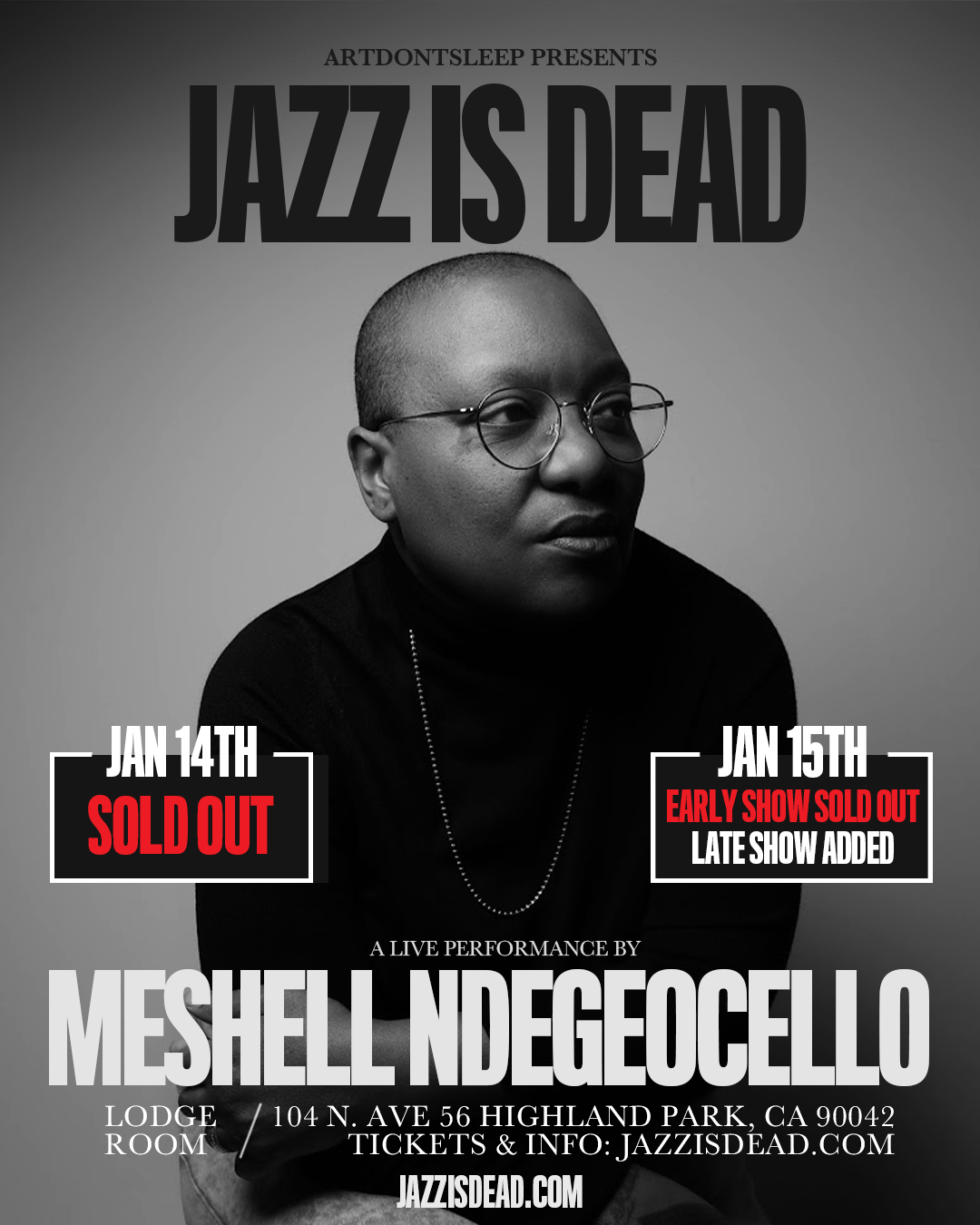
Meshell Ndegeocello
Meshell Ndegeocello is an unassuming colossus whose body of work extends far beyond the early hits and virtuosic bass playing with which she is most associated. "If That's Your Boyfriend (He Wasn't Last Night)," her taunting and funky breakout single, immediately set her apart as an instrumentalist, vocalist, songwriter, and producer. Less than a year after the song entered Billboard's R&B/hip-hop, dance, and pop charts, Ndegeocello was nominated for four Grammys, including Best R&B Album for Plantation Lullabies (1993) and Best Pop Vocal Collaboration for "Wild Night," her Top Ten hit duet with John Mellencamp.
Ndegeocello has remained impossible to typecast ever since. A preternatural synthesist, she has mixed and moved across jazz, blues, soul, funk, and reggae, as well as folk and rock. As a leader, she has alternated just as freely between small combos and large ensembles, and as a session musician and featured artist has written and recorded across an even wider spectrum of styles. In addition to her lithe and melodic primary instrument and vocals encompassing authoritative raps, pensive spoken word, and ethereal choruses, Ndegeocello has played keyboards, drums, and guitar, among other instruments. Foremost among the many highlights in her catalog are three additional Grammy-nominated albums: the oft-pointed and probing Peace Beyond Passion (1996), the imaginative covers set Ventriloquism (2018), and the wide-scoped Omnichord Real Book (2023), the latter of which marked her Blue Note debut and took the first Grammy for Best Alternative Jazz Album. The following year, Ndegeocello was behind the Sun Ra tribute Red Hot & Ra: The Magic City and No More Water: The Gospel of James Baldwin.
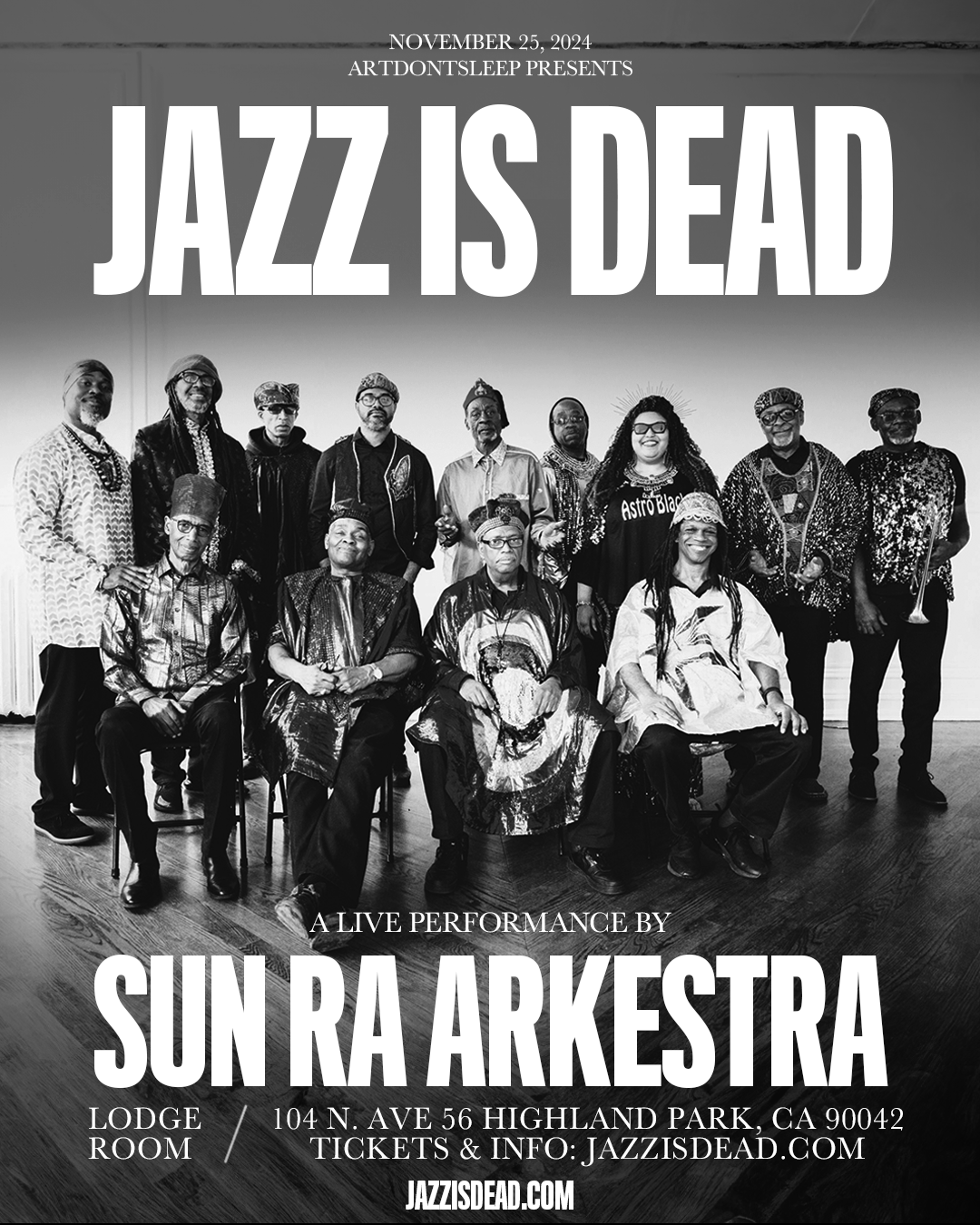
SUN RA ARKESTRA
Sun Ra founded the Sun Ra Arkestra in Chicago in the mid-1950’s. Sun Ra was among the earliest pioneers of the synthesizer and the free jazz revolution of 1960’s. Sun Ra sent a strong spiritual and musical message to his Arkestra wanting them to help make the universe better through positive vibrations and music.
The Sun Ra Arkestra are known worldwide for their live shows that combine big-band swing, space-age free jazz, be-bop, singing, dancing, chanting and Afro-pageantry. The Arkestra has been at the forefront of Afro-futurism since their inception.
The Arkestra have recorded more than 100 albums. Their 2020 album “Swirling” was nominated for a Grammy Award for Best Big Band Jazz Ensemble recording.
After more than 60 years the band continue to circle the globe on their Inter-Galactic tour. Recent highlights include shows at the Kennedy Center with Solange, The Berlin Opera House, the Burlington Jazz Festival and a New York City show at Radio City Music Hall.
Few bands have travelled this far – cosmically and musically.
“The possible has been tried and failed. Now it’s time to try the impossible.”
Sun Ra Space is the Place!
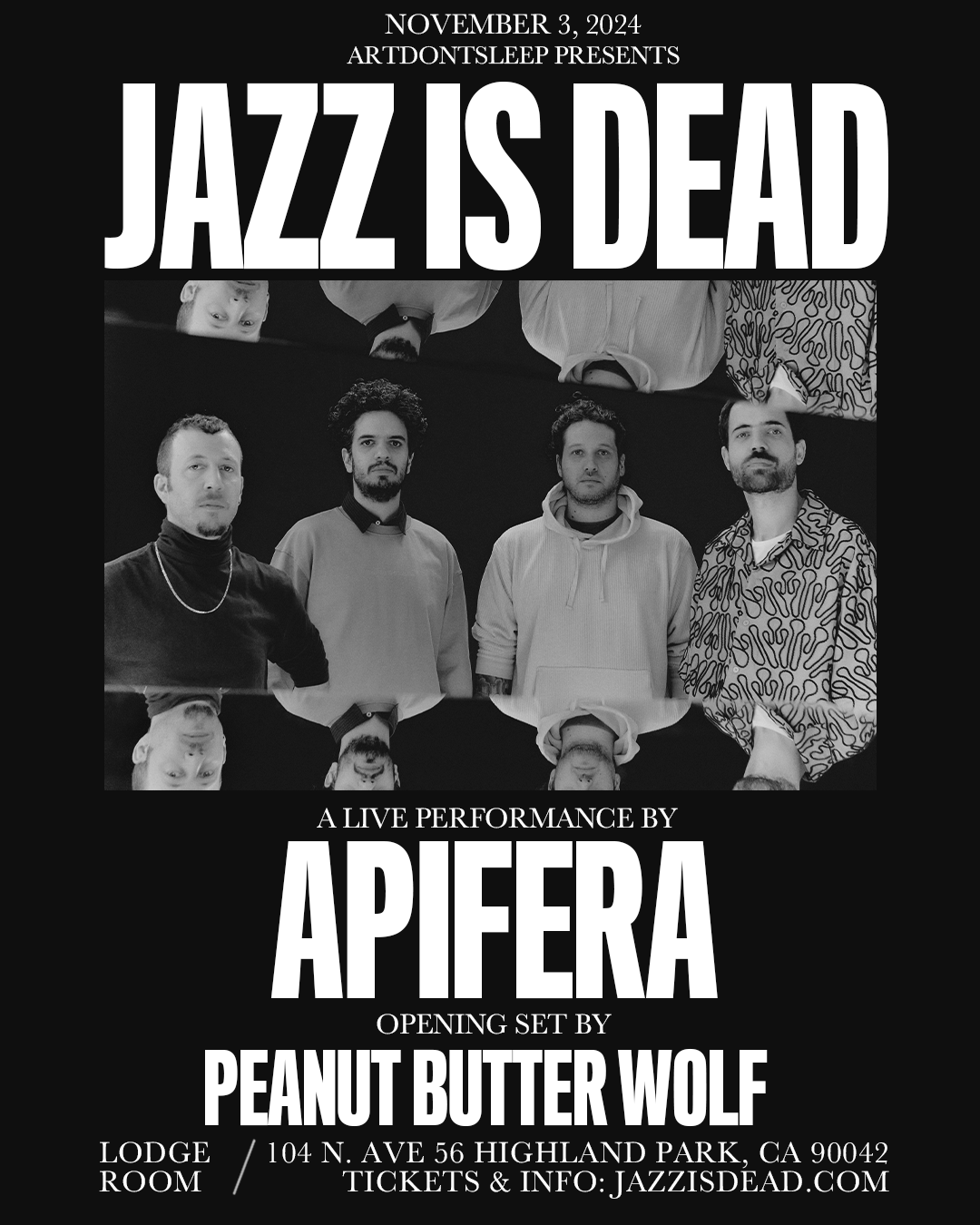
APIFERA
Apifera – Nitai Hershkovits, Yuvi Havkin, Amir Bresler and Yonatan Albalak – bring a melting pot of influences and experience to their second album Keep the Outside Open. When these different musicians come together, the effect is like switching between radio stations: a dash of prog, a twist of post-rock, and a heavy dose of psychedelia, with the members’ shared background in jazz tying it all together.
Keep the Outside Open came about organically, arising from the friends’ hangouts at Yuvi’s studio culminating in late-night smoke sessions spent laughing at dad jokes, goofy names for demos, and made-up words: “Bazooka” when the music is happy, “sweating at the gig” when the arrangement isn’t tight, and “slug” if things aren’t clicking.
Apifera’s Stones Throw debut Overstand was instrumental, but when it came to recording Keep The Outside Open,they felt closer than ever and ready to try a more intimate approach. They let their imaginations run wild, wrapping personal stories from everyday life within fantasy and fictional characters.
“Theodor Marmalade” tells the story of a curious fellow who escapes humanity in search of nature, only to find he now misses the energy of society. The band says: “We all grew up in cities and at some point got tired of them. There’s always a dream of leaving to some secluded spot, but once you’re there, you feel detached from society, however fucked up it is.” Other songs tell of encounters with talking machines (“Mr. Pullman”), searching for a cat called Iris who’s chasing a bat named Neil (“Iris Is Neil"), and childhood fear of the dark (“The Curious Wild”). Threaded throughout is Apifera’s belief in the healing power of nature: “life, even when it’s weird, somewhere there’s a tree I can hug”.
The band’s members all have deep roots in their musical community: Yuvi releases electronic jazz as Rejoicer; Yonatan is frontman for post-rock/psych jazz band Geshem; Amir’s group Liquid Saloon blends afrobeat with jazz funk; and Nitai is best known for his solo piano records, with a 2023 album on ECM (spot the nod to the label in Keep The Outside Open’s tracklist). They call on their friend, trumpeter Avishai Cohen, for the album’s closing track, “Sera Sam”.
Apifera’s new album title surfaced after “we’re closing the outside” was yelled after shows at their favorite local jazz club. They decided to give the words a “surreal twist” for the record: “Over the last few years, we’ve felt the walls closing on our everyday lives, our culture and music. Keep The Outside Open is a call for the world to be open. To return to its free and wild state.” Mindful that this is a heartbreaking time of violence and war, the band adds, “We do not support violence of any kind and can’t fathom how the world today could choose anything other than peace, but until such a time comes when humanity can transcend boundaries and conflicts, we are dedicated to the unifying power of music.”
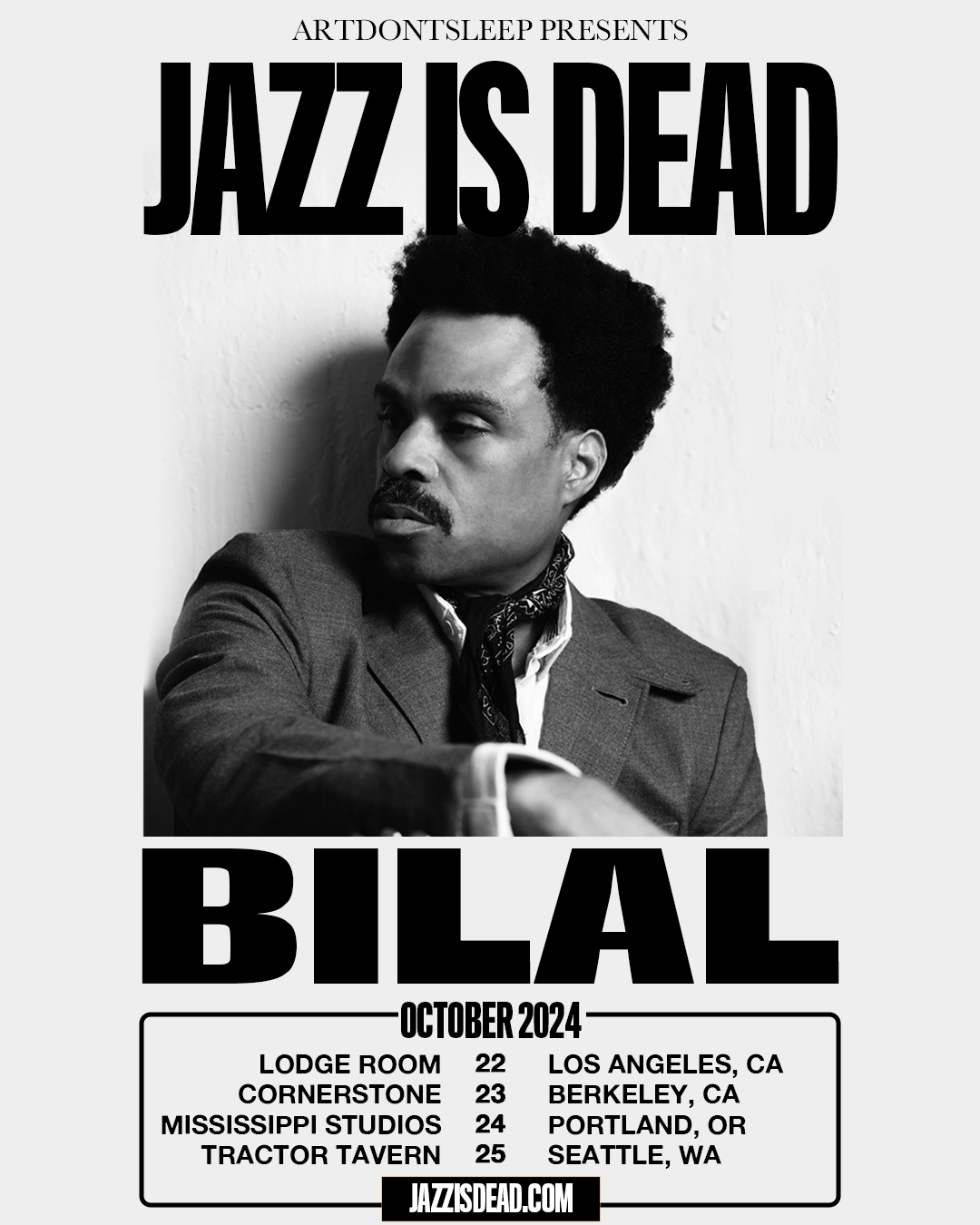
Bilal Tour
Bilal Sayeed Oliver is a truly independent artist. A singer, songwriter, and producer who has always been ahead of his time - blending jazz, afro-futurism, classic soul, alternative r&b, rock, and even classical in his vocals and music. He's known for his wide vocal range, work across multiple genres, and magnetic live performances. Philip Bailey said Bilal is the rare singer who uses his voice like an instrument.
Interscope Records signed Bilal to a major label recording deal fresh out of college, after studying jazz composition and opera at The New School in NYC. His debut album, “First Born Second," showcased a range from the emotionally charged fan-favorite, "Soul Sista," which peaked at No. 18 on the Top R&B/Hip-Hop Songs charts, to the political viewpoints of "Fast Lane" and "Second Child”.
Bilal quickly developed a sizable following at his live shows which were known for being emotional and elecrifying. He received great acclaim from his peers, who noted his range and ability to sing in a freeform style and his classically trained falsetto. The soulful feel of the album caused Bilal to be labeled as "neo-soul,” but throughout his career his expansion in music and pushing of boundaries has proved his point that he is much more than that.
Playing jazz venues and recording more progressive soul music in the following years, Bilal has commercially released four albums to critical success. His unreleased but widely leaked second album “Love for Sale” found wide acclaim among critics and listeners. It features collabs with Dr. Dre and J Dilla and was built around Bilal’s own musicianship, included live instrumentation and had a vibe completely new and different from its predecessor. Interscope shelved the album indefinitely. It still received over half a million downloads and Bilal began touring even though there was no proper release of the album.
As a member of the Soulquarians, an experimental collective that was active from the late 1990s to early 2000s, Bilal has been culturally and musicially influencial on a whole new generation of musicians and producers. His extensive list of collaborations includes Kendrick Lamar, Common, Erykah Badu, Jay-Z, Beyoncé, Guru, Kimbra, J Dilla, Adrian Younge, Robert Glasper, and The Roots.
"Airtight's Revenge,” his experimental 2011 album, blends jazz, hip-hop, electronic, rock, soul, and blues into one raw, genuine collection of music. The album's single, "Little One", earned Bilal a 2011 Grammy Award nomination in the category of Best Urban/Alternative Performance. That year, he was also on the Roots' Grammy-nominated album Undun (2011) and the Robert Glasper Experiment's Grammy-winning Black Radio (2012).
With the release of his next album, “A Love Surreal,” Bilal immediately achieved commercial success, debuting at No. 1 on iTunes' R&B Chart. On Billboard, the album debuted at No. 17 on the Independent Albums Chart, No. 19 on the R&B Albums Chart, and No. 103 on the Billboard 200. The album received shining reviews, including an 8/10 from SPIN magazine,4.5/5 stars from Allmusic, and 4/4 stars from USA Today.
In an essay on the Soulquarians, Michael A. Gonzales traces the collective's impact to Bilal's contemporary contributions: "Listening to Kendrick Lamar's newest album “To Pimp a Butterfly”, “Bilal has transformed himself for the post-Soulquarian generation that includes Robert Glasper, Esperanza Spalding and now Kendrick.”
In August 2020, during the COVID-19 lockdown, Bilal wrote and recorded his first EP, Voyage-19, over the course of three days and in collaboration with various musicians in remote experimental sessions, which were streamed live on YouTube. The resulting three-track EP was released digitally the following month, with revenues of its sale and accompanying donations given to the participating artists, many of whom had been struggling financially due to the pandemic.
He is working on new music and currently splits his time between the US and Morocco, where he paints and writes music.
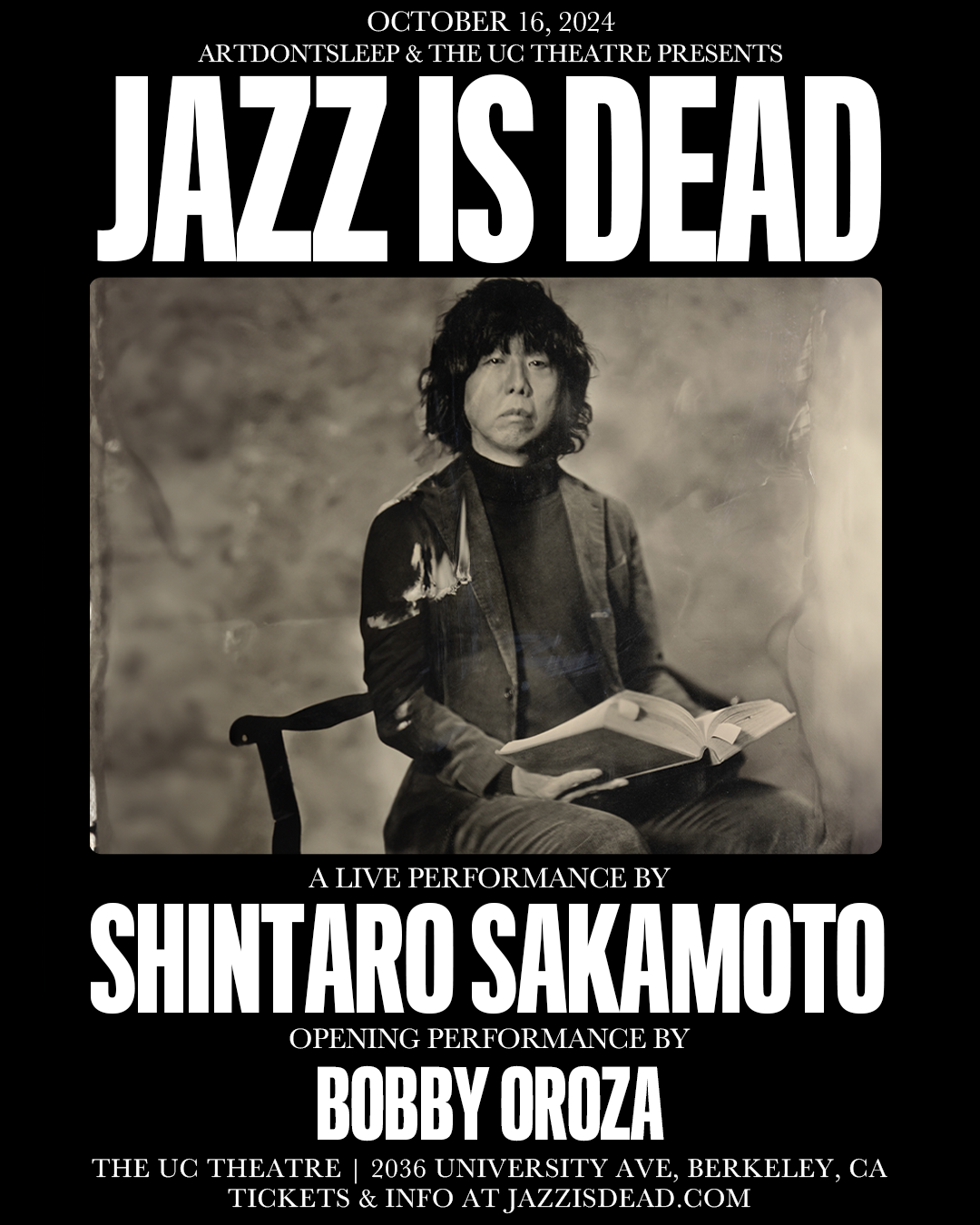
Shintaro Sakamoto
Shintaro Sakamoto Bio
Shintaro Sakamoto is a Japanese music composer, producer, writer and singer based in Tokyo.He began his career in 1989 as a member of the rock band “Yura Yura Teikoku”, where he played guitar and sang. YYT released 10 albums over the course of 21 years, disbanding in 2010. After 20+years with psych legends Yura Yura Teikoku, in 2011, Shintaro launched a solo career and started his own record label, “zelone records.” He released his debut solo album “How To Live With A Phantom” to critical acclaim in Japan in 2011, and Other Music Recording & Co. licensed the album for US/EU/UK release in 2012.In 2014, Shintaro released a split 7-inch single with Mayer Hawthorne for Record Store Day, and then released his 2nd solo album “Let’s Dance Raw.” Once again, Other Music Recording & Co. licensed the album for US/EU/UK release (and it reached #2 on Billboard’s “World Chart” in October, 2014).
Shintaro’s 3rd solo album “Love If Possible” was released in Japan in 2016, and “Love If Possible” was released digitally worldwide on January 2017.
Mesh-Key Records NYC issued an LP of “Love If Possible” for US/EU/UK in September 2017 and a split 7-inch single with Devendra Banhart was also released in Germany. Shintaro gave his first solo live performance with his band at the WEEK-END FES in Cologne Germany. In 2018, he had went to live peformance in China (tour), Netherlands (Le Guess Who? Fes), London and Mexico (Tropico Fes.). In 2019, he joined a song "Volta e meia” with Devendra Banhert on the Brazilian rock band, O Terno's new album "atrás/além”. In the same year, he succeeded US headliner tours (SF, SR, Chicago and NY). And in 2022, 6 years since his last album, Love If Possible, Shintaro has completed his fourth solo album, "Like A Fable". From this album, digital and physical distribution to the global except Japan will be Secretly Distribution, and LP vinyl will be released worldwide in 2023.
In 2023, Shintaro performed at the RISING festival in Melbourne, Australia, and this year, he headlined the first day of JOYLAND 2024 in Bali, Indonesia.
Bobby Oroza Bio
After years of grinding as a sideman in the Finnish music scene, Bobby Oroza has stepped up to make his voice heard. Always with an air of crude romanticism, Bobby pushes towards an expression transcending the borders of soul and rock balladry. His dark and intimate debut single ”This Love” didn’t take long to reach the ears and hearts of a worldwide soul music community and is already a proper classic amongst the lowrider and soul collector scenes. Bobby was born in Helsinki, Finland into a family of musicians and artists. During frequent family parties Bobby ́s Bolivian grandfather would pick up a guitar and sing Latin canciones and Cuban classics. Bobby ́s mother is a singer and his father a gypsy-style jazz guitarist. All his siblings work in show business and music. As a kid, Bobby was lucky to grow up surrounded by his parents’ record collection which included early jazz and blues, Motown hits, gospel ensembles, and doo-wop groups like The Drifters and The Clovers. The Soul records were balanced out by Brazilian ones, African ones, his mother’s collection of North and South American folk songs, and Nuyorican Salsa albums. All of these influences show up in Bobby’s music.
Bobby started working professionally as a musician in his early teens. His main instruments are guitar and percussion. Before finishing high school Bobby decided he needed to experience the rhythmic source that had inspired him the most, and travelled to Santiago, Cuba. There he studied percussion and singing intensively for months. Since his return he’s been producing, recording and performing music to make a living for his family. Teaming up with the Timmion Records house band Cold Diamond & Mink, led by Jukka Sarapää, Sami Kantelinen, and guitarist/composer Seppo Salmi, he has a tight quartet of musicians to support his vision. With his instant classic, debut album “This Love” Oroza has shared his strange and unique shade of Soul with the world, creating a cult-like following for his sound from Finland to sunny Southern California and beyond.
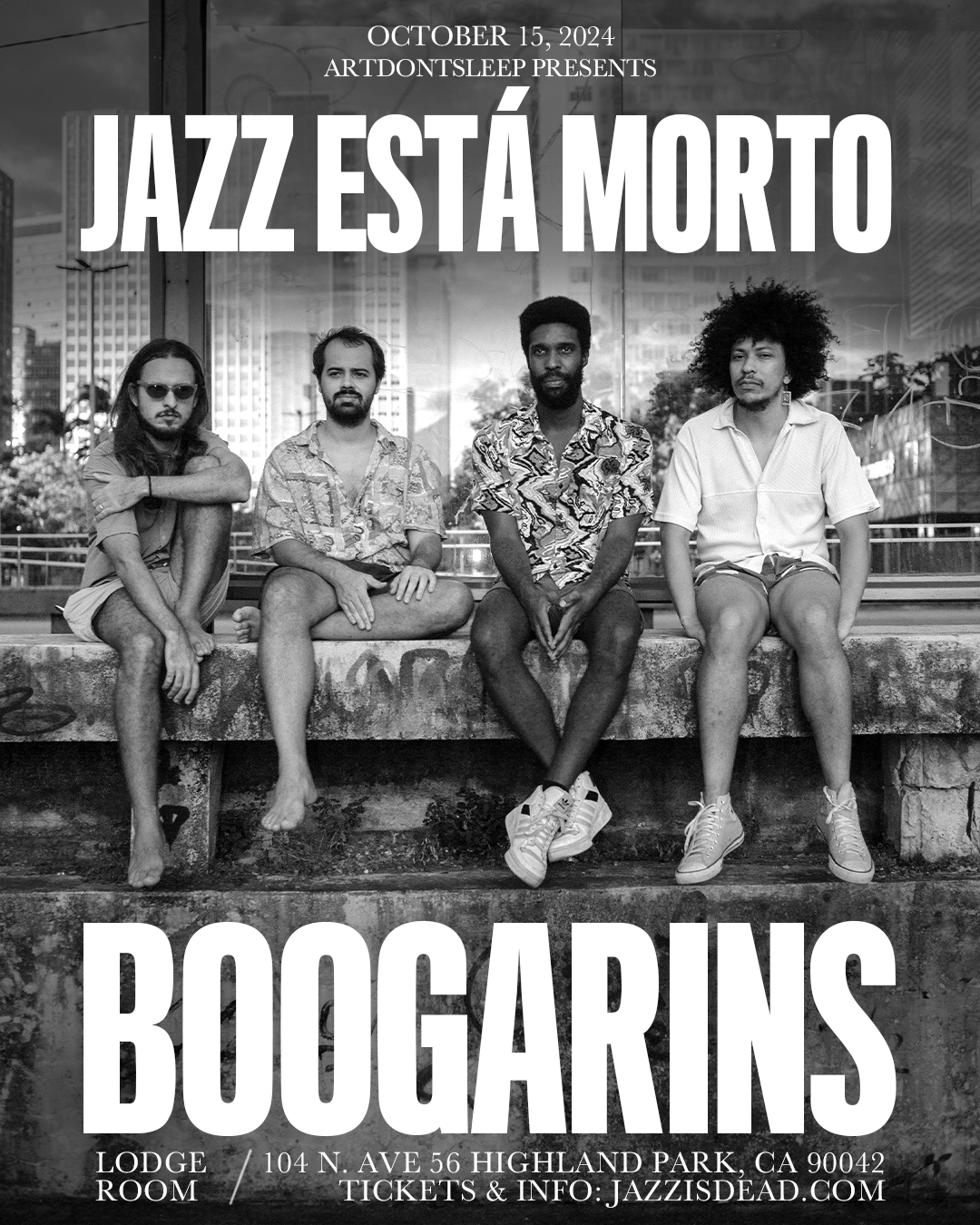
Boogarins
In 2024 Boogarins have shown that their creative flourish got to a more mature but not less intense mood. After a US tour in the first semester celebrating the 10th anniversary of their first record the band took this tour to their home country and also kept doing some concerts with the set “Boogarins Toca Clube da Esquina'', a special homage where they show their true deep influences and infuse the band sound into brazilian classics from artists that are in this specific scene of 70’s Brazilian Music, like Milton Nascimento, Lô Borges, Beto Guedes and others. The band are now coming back for their second North America trip of the year, this time hitting up new cities and acclaimed festivals like Desert Daze, Levitation and Hipnosis in Mexico. For this second round, Boogarins promises a new record till December and concerts with new songs and their unforgettable vibrant stage energy.
Initially a lo-fi project from Goiânia, land of the Sertanejo (Brazil’s country music), Boogarins have become one of the most celebrated Brazilian rock acts internationally: charming audiences around the world with intense performances where their beautiful songs are immersed in sonic textures and improvisations that transcend the language barrier. The group began its journey in 2013 on the underground stages of their hometown Goiânia, when they released their first EP As Plantas Que Curam. It caught the ear of US label Fat Possum/Other Music who re-released the group’s home-recorded debut later that year, earning positive reviews in the New York Times, Pitchfork, Chicago Tribune and paving the way for greater recognition of the band in Brazil. The following year the band toured through Europe and the United States supporting acts like The Clean, Of Montreal, Guided By Voices and Neutral Milk Hotel. During those tours, Boogarins produced their second album, Latin Grammy nominee Manual (2015). Between 2016 and 2018, the band was based in Austin, Texas, and recorded extensively between tours, ultimately resulting in their next two albums, the conceptual Lá Vem a Morte (2017) and Sombrou Dúvida (2019), which took them to major festivals around the world such as Coachella, Desert Daze Rock In Rio, Paredes de Coura and their first performance in South Africa.
During Pandemic times, they got very active with digital releases, partnerships with new brazilian artists and music production workshops, releasing a two volume b-side compilation (Manchaca) and also presenting a six episode visual experience of their Sessões De Cura e Libertação (Healing and Liberation Sessions) – what the band call their free improvisation sets, sometimes presented as a compliment to their actual sets.
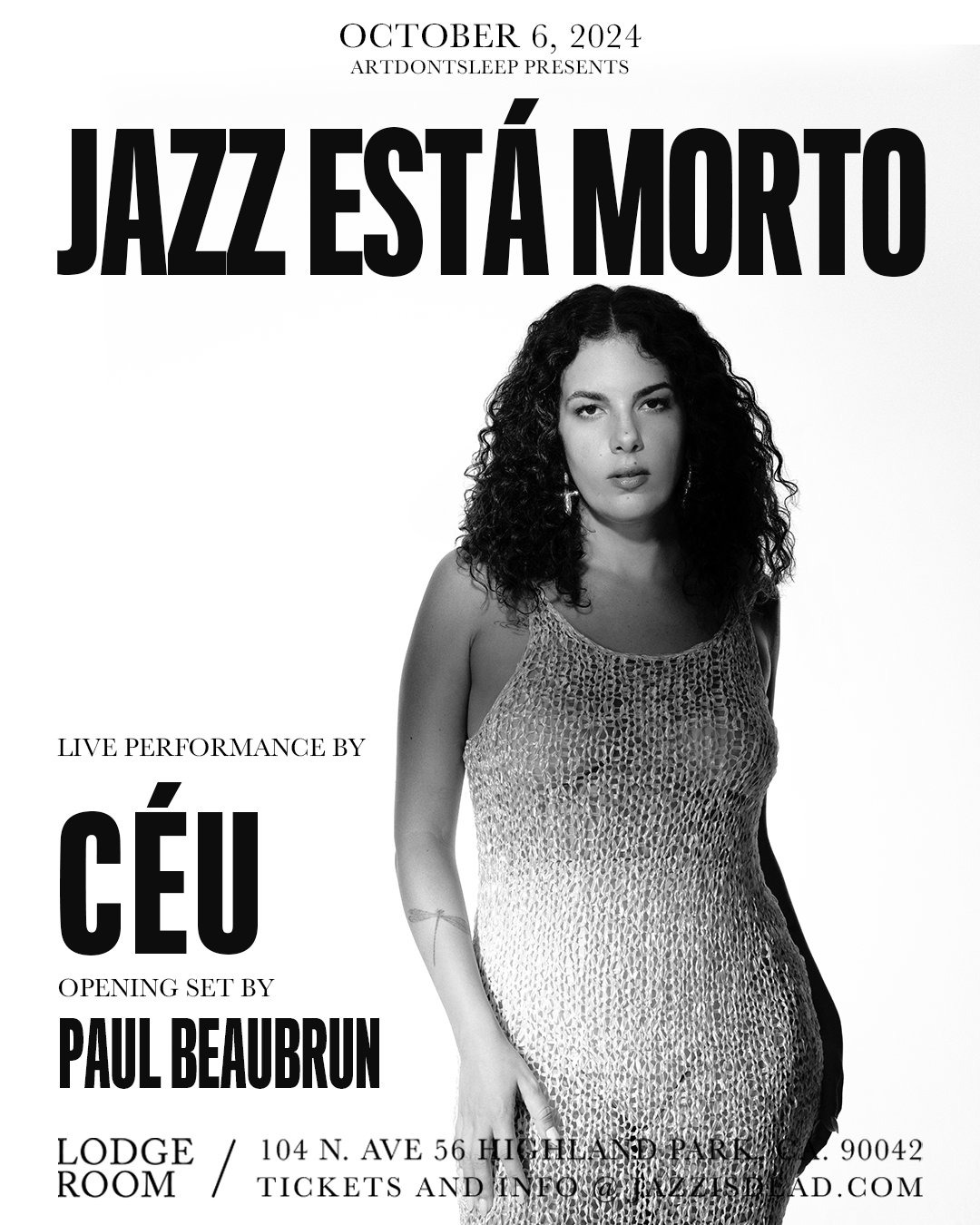
CÉU
Recorded in the USA, the album features musical production by the artist, Pupillo, and Adrian Younge.
Céu discovered herself as a songwriter during a season in the Lower East Side of New York. In the early 2000s, influenced by the performances of black and Puerto Rican MCs on the neighborhood's streets, the budding interpreter was seized by an extreme freedom to express herself through her own music. This boldness is evident in her debut album, "Céu" (2005), a record nominated for both the Grammy Awards and the Latin Grammy Awards, featured on various charts worldwide and on Billboard, becoming one of the best-selling Brazilian albums in the history of the United States. This audacity continues to guide her unique transnational journey, acclaimed with renowned awards and, no less importantly, recognition from audiences who deeply resonate with her.
In 2023, Céu returned to the USA, this time to the West Coast, where she conceived "Novela" (Urban Jungle/ONErpm), her sixth album of unreleased songs in her career, set to be released on digital platforms on April 26th. Recorded at Linear Labs Studio in Los Angeles, the production is signed by the São Paulo-born artist, the musician and producer from Pernambuco, Pupillo – former drummer of Nação Zumbi, co-responsible for "Tropix" (2016) and "APKÁ!" (2019), both by Céu, winners of three Latin Grammy Awards, and a producer for Gal Costa and Erasmo Carlos - and by the American multi-instrumentalist and arranger Adrian Younge, owner of Linear Labs, known for albums such as "Something About April" (2011), and for projects with Snoop Dogg, Kendrick Lamar, The Delfonics, and Wu Tang Clan, as well as co-directing the multimedia initiative Jazz Is Dead.
As is customary in Adrian's work, the album was captured live, without the technological gadgets of today. Recorded on tape, in a dynamic moment that demands total presence. An old-fashioned approach that harkens back to the beginnings of character-forming record recordings. Interestingly, a futuristic experience that, according to Céu, requires a lot of emotional intelligence and no artificiality. "Nothing vintage," she assures. In the studio, the band consisted of Pupillo (on percussion, programming, and drums), Younge (on keyboards, guitar, bass - in "Reescreve" -, arrangements, and conducting strings and winds), and Lucas Martins (on bass - in virtually all tracks -, guitar, and co-authorship of three of the 12 tracks on the album).
"Dawned in your lucky color/ Chant your mantra and go/ Singing/ Living is for the brave," says the lyrics of "Raiou," which opens "Novela." American MC and songwriter, LadyBug Mecca, from Digable Planets, whose parents are Brazilian, shares vocals with Céu. In "Gerando na alta," it's the turn of anaiis, a Franco-Senegalese singer and songwriter, based in London, England, to exchange impressions about sisterhood. Loren Oden and Jensine Benitez, singers from the USA, feature on "Into my Novela," a collaboration between Céu and Lucas Martins, the informal title track of the album, which talks about the teledrama of everyday life, where there are no TV cameras recording actions, nor predefined scripts. "I am the protagonist of my Novela/ So good, yeah baby/ I want to learn how you want me/ To love you."
There are other significant characters in the plot. Frankie Reyes, an American DJ and producer of Puerto Rican descent, contributes to the harmony of the track "Buá Buá," where Céu, the owner of the melody and lyrics, says: "Cry all the tears that one day/ You refused to cry/ Cry because you recognize/ That you won't find one of these." Hervé Salters, a French artist and leader of General Elektriks, co-producer of "Tropix," appears on "High na Cachú," whose verses by Céu say: "Cold sweet water makes me reborn/ While the stone calls me back to sit/ Retaining all the heat it kept from the sun/ I settle like a flower pollinating." Marcos Valle, a national treasure from Rio de Janeiro, co-wrote "Reescreve" with the São Paulo-born artist, which, at the end of the affectionate session, questions the perspective of colonizers in Brazilian history textbooks. "What was there/ I never believed in/ Every page I read/ Just made me more sleepy/ Since the peoples who were silenced/ The embers came to burn/ The truth comes to light/ It's too much material to work with." Before that, "Corpo e colo," the only track by third parties, is the result of the encounter between Nando Reis and Kleber Lucas. Recently, on social media, the award-winning gospel artist and pastor of Igreja Batista Soul, in Rio, celebrated the fact. "Another beauty coming. Beautiful partnership I made with my bro Nando Reis. I just received a preview of him singing and I am simply ecstatic," he said.
In "Novela," ancient technologies, healing, creaminess, bolero, polished stars, echoes of soul music, things of the earth, rap, and whispers to guides emerge. Throughout the record, there is a reaffirmation of the author's fearlessness, committed to her time, in the complexity and beauty of creative work. Always keeping the diversity of Brazilian music on the horizon. Stay tuned for exciting scenes from the next chapters.

Delvon Lamarr Organ Trio
DELVON LAMARR ORGAN TRIO—or as it is sometimes referred to, DLO3—specializes in the lost art of “feel-good music.” The precise sequence of music chosen by Delvon is unique in itself, as he creates an experience for each show based on the vibe and feel of that audience. This includes the 1960s organ jazz stylings of Jimmy Smith and Baby Face Willette, a tweak of the snappy soul strut of Booker T. & The M.G.’s, and The Meters. It teases you with Motown, Stax Records, Blues, and many other styles that may surprise you. It’s a concoction that goes straight to your heart and soul, leaving you emotionally connected on a whole new level.
The band features organist Delvon Lamarr, a self-taught virtuosic musician with perfect pitch who taught himself jazz and has effortlessly been able to play many instruments. The trio is formed by collecting a unique blend of guitarists and drummers worldwide. They leave you with a feeling of wonder caused by seeing something surprisingly beautiful and unforgettable for their fans at every show.
DLO3 was formed from the ground up by Delvon’s wife and manager, Amy Novo, together they created feel-good music to heal the world. The trio started from humble beginnings in 2015 and has since released several Billboard charting albums and toured the world to sold-out venues. Today, the power couple has taken the Delvon Lamarr Organ Trio beyond their wildest dreams through her tireless work ethic and his bottomless talent.
The trio started from humble beginnings in 2015, but since then has released several Billboard charting albums and toured the world to sold-out venues. Not to mention, Congratulations to Delvon Lamarr on being named the Rising Star Critics Choice for Organist of the Year! Check out the 70th Annual Downbeat Critics Poll.





